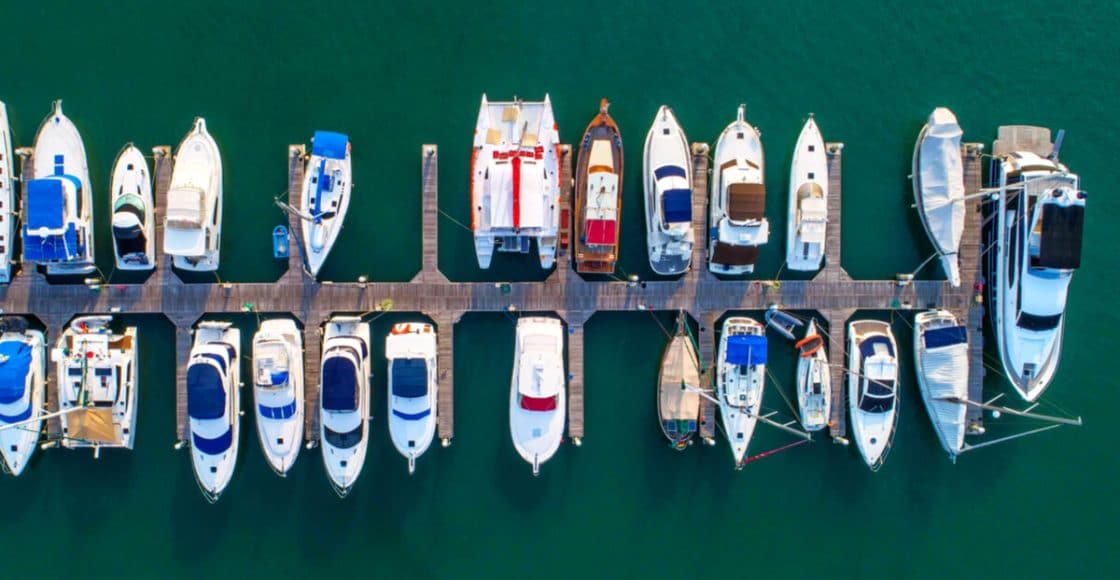

Yachts vs. Boats: What are the Differences?

Table of Contents
Many people use the words “boat” and “yacht” interchangeably, and some lean on the latter to make their ride sound more impressive. But what are the key differences between boats and yachts?
First, let’s look at some broad definitions of a boat, a yacht, and other related vessels.
- “Boat” can refer to just about any kind of vessel— towboat , fishing boat , center console , houseboat , and so on.
- “Dinghy” designates a small boat with a human or wind means of propulsion including a rowing dinghy or sailing dinghy. It also refers to a tender to a bigger boat or yacht.
- “Ship” is a large commercial boat, often used for distance travel and transport of goods or passengers – cruise ship, container ship, etc.
- “Yacht” is typically a larger boat with luxury amenities used as a recreational vessel— motor yacht , sailing yacht .
- “Superyacht” is a large yacht and is often also called a mega yacht . The delineation used to be at 80-feet but again, with today’s size creep, anything under 100 feet would just simply be called a yacht.
So, yacht or boat? Let’s dive deeper into the elements that differentiate a boat from a yacht.
Own a Boat or a Yacht? Learn How to Offset the Cost of Ownership by Listing on Boatsetter
Size of the Vessel
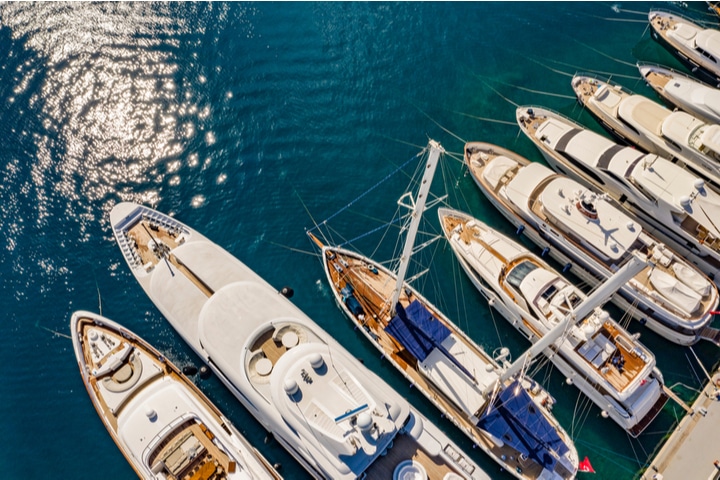
Some place a hard line at 35 feet. Below that, you have a boat and above, it’s a yacht. However, that’s an artificial differentiator.
Just 30 years ago, a 30-foot boat was considered large and could have been a yacht but as recreational boats grow longer, the term yacht has been pushed up the scale.
That said, a well-kept 40-foot boat designed for recreation can technically still be called a yacht (although larger vessels are likely to cost more, price isn’t a good indicator of yacht status primarily because it fluctuates with brand, age, and amenities).
Check out local yacht rentals near you to understand how size plays a difference.
What it’s Used For
A yacht is a vessel designed for recreational purposes. It generally operates on open waters (rather than small lakes or rivers) and has accommodations for overnight guests.
A cruise ship, on the other hand, accommodates a large number of passengers in a commercial setting whereas a yacht carries a smaller number (of paying or non-paying) passengers for private recreation.
Onboard Technology
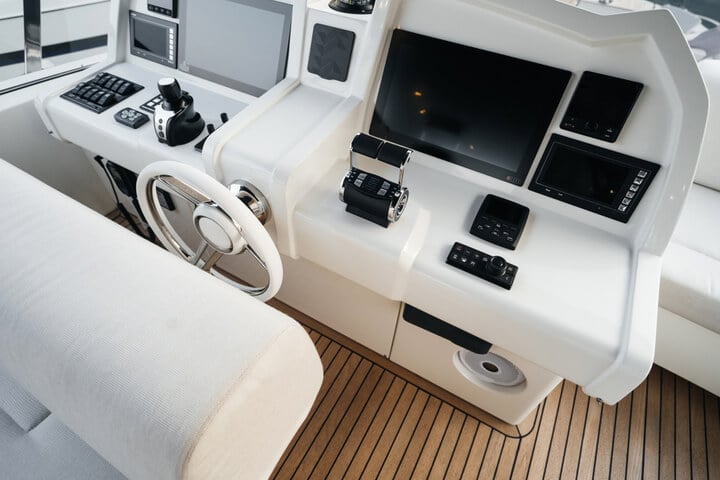
Advanced technology for navigation, communications, and system operation as well as redundant systems for safety can be found on a yacht that is likely to venture farther.
Again, there are caveats because today’s towboats that are fun day boats also feature technology such as GPS and digital switching that integrates many electrical and electronic features.
Propulsion Types
This is a tricky one. “Yacht” comes from the Dutch word “jaght” which referred to a sailing vessel that was used by the navy to capture pirate ships and later for recreation by the affluent.
Today, a yacht can be a large sailing vessel or a motor yacht. All larger yachts will have a motor for propulsion whether they have sails or not. Sailboats by design have smaller motors so trying to put a horsepower minimum on yacht propulsion is simply inaccurate.
Some define a yacht as having multiple crews to operate the vessel and tend to passengers or guests. The larger the yacht, the more crew will be required to navigate, maintain and service the vessel. That said, a couple who owns a 50-footer can call their boat a yacht although it’s owner-operated.
Luxury and Amenities
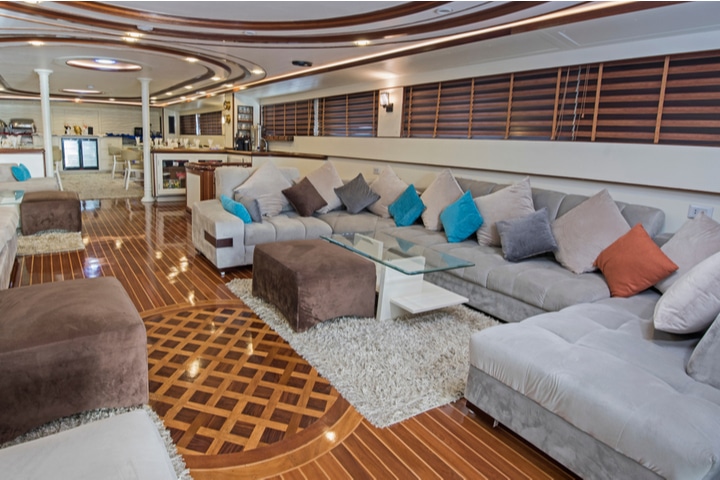
This is perhaps the best measure of a yacht. If the vessel offers accommodations, a galley , a head , and is luxurious in its presentation, it’s most likely a yacht.
That said, there are lots of center console fishing boats and towboats that are pretty nicely equipped these days and they wouldn’t be called a yacht.
All yachts are boats, but not all boats are yachts—and the lines are blurry. The word yacht elicits images of posh seafaring experiences while a boat evokes ideas of fun and perhaps work. Do some research to learn what size and type of boat or yacht is best for you .
To a degree, the point at which a boat becomes a yacht is in the ear of the beholder but if you focus on size, amenities, and the type of use, you’ll be able to discern the difference. Then all that remains is to find a way to spend time and have fun on any kind of vessel.
Browse All Available Boat & Yacht Rentals Across the Globe

Zuzana Prochazka is an award-winning freelance journalist and photographer with regular contributions to more than a dozen sailing and powerboating magazines and online publications including Southern Boating, SEA, Latitudes & Attitudes and SAIL. She is SAIL magazines Charter Editor and the Executive Director of Boating Writers International. Zuzana serves as judge for SAIL’s Best Boats awards and for Europe’s Best of Boats in Berlin.
A USCG 100 Ton Master, Zuzana founded and manages a flotilla charter organization called Zescapes that takes guests adventure sailing at destinations worldwide.
Zuzana has lived in Europe, Africa and the United States and has traveled extensively in South America, the islands of the South Pacific and Mexico.
Browse by experience

Explore articles

8 Best Chicago Marinas

Boatsetter’s 2023 Waterway Clean-Ups | #MindYourWake
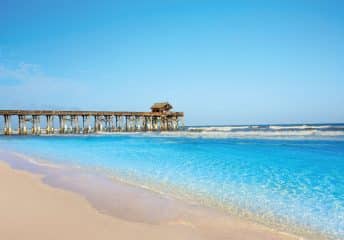
5 Best Cocoa Beach Waterfront Restaurants

How becoming a charter boat captain is easier than ever
- Pontoon Boats
- Personal Watercraft
- nauticalknowhow
- Nautical Knots
- Tools and Calculators
Yacht vs Boat: What’s the Difference?
You may be surprised to learn that the difference between a yacht and a typical boat is not as easy to figure out as you’d think. This is thanks to the fact that there’s no specific definition for what a yacht actually is. In general, and as most people commonly use and understand these words, a yacht is a fast, often luxurious vessel used for recreational purposes. A boat, on the other hand, is typically a smaller vessel and it can have many purposes from recreation to fishing to rescue and more.
Let’s get into some of the specific differences between yachts and boats to get a better idea of what each of these admittedly general terms is trying to refer to.
What is a Yacht?
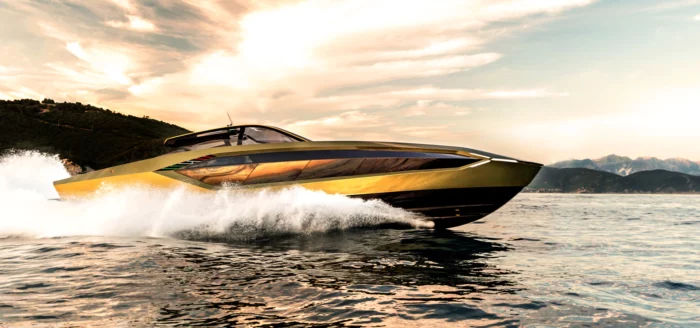
Yacht comes from a Dutch word jaghte , itself from the word jaghtschip which means “fast pirate ship.” That gives you an idea of where people’s heads were at when yachts first came on the scene. These days, the pirate part isn’t really involved but you do tend to expect a yacht to have some speed. Not that these are necessarily speed boats all the time, but there are racing yachts out there that people use exclusively for that purpose.
Because there is no specific definition for the word yacht in modern usage, you have to play it by ear a little bit. It’s one of those words that we all know what it means, even if we don’t have a proper, set in stone definition.
In general, and for most people, a yacht is a large recreational boat, capable of reaching high speeds and noted for its luxury and features. So what does any of that mean?
In terms of size, most people but not all would consider a yacht to be a boat that has reached at least 78 feet. Some people would acknowledge smaller vessels, as low as even 33 feet, as yachts, but this can be hotly debated even among yacht makers and yacht charter companies.
What is a Boat?

One of the oldest words in any language, boat can be traced back through Middle English to Olde English to proto-Germanic to the proto-IndoEuropean word “bheid” where it may have originally meant “to split” or something along those lines. That would have referred to simply splitting or hollowing wood to make a boat. So, by that definition, a boat is incredibly loosely defined.
In modern understanding a yacht is a boat but not all boats are yachts. Consider boat more of an overarching term like automobile while yacht is like an SUV. There are lots of other automobiles and SUV is just one kind.
Usually when people talk about boats today they mean smaller vessels. At some point, large boats become ships, and potentially even a yacht. Smaller boats could be anything from a fishing boat to a jon boat to a sailboat , a bass boat , catamaran , pontoon boat and more. Those boats often have very different forms and functions which allow for a heck of a lot of variety and usage.
Yacht Size vs Boat Size
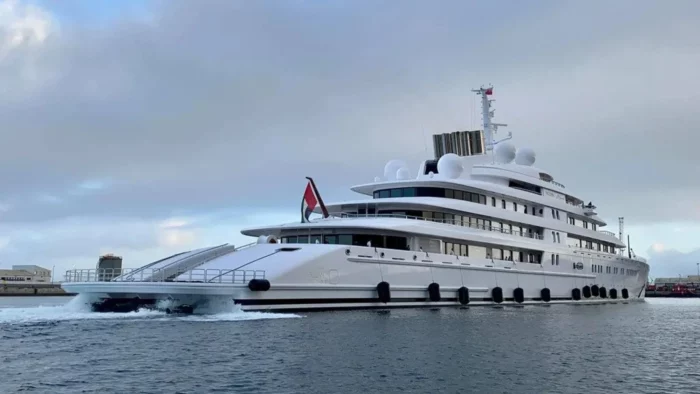
As we mentioned above, people have different opinions about how big a yacht has to be. The bare minimum seems to be at least 33 feet. That said,I have even seen smaller boats called yachts but let’s say, at a minimum, any vessel under 30 feet will always be a boat of some kind and would rarely if ever be properly called a yacht.
Larger boats exist and are not yachts, of course, but these can be sport fishing boats, catamarans, even large pontoons, houseboats and more.
Yachts can start at that low range and get up to incredible sizes which we will touch on in a moment. The largest yachts can get close to 600 feet.
Mega Yachts vs Larger Boats

Once a yacht hits 120 feet people often call it a super yacht. There doesn’t seem to be an easy to find historical reason why 120 feet is the cut off that makes a super yacht. As yachts grew even larger, 200 feet became a sort of milestone for where a superyacht became a mega yacht. And nowadays, with even bigger yachts available, 400 feet is where the cut off often begins for yachts known as gigayachts.
Now, when it comes to large boats, here’s where things get fuzzy. You can find sport fishing boats that are over 120 feet, or sailboats that reach the same length and much bigger. But these are often also called yachts. Sailing yachts, sport fishing yachts. So there’s a line there that boats can straddle even if, under a certain length, the same boats wouldn’t be considered yachts.
Part of the transition from boat to yacht at large sizes comes from the fact that a massive boat is obviously expensive which means more luxury features are likely to be included which means it’s more likely to be considered a yacht.
But large commercial vessels, military and law enforcement vessels, and some search and rescue vessels used by government agencies or private companies can also reach lengths of 60 feet to 100 feet and more and these would obviously never be called yachts. It’s that key feature of being used for recreation that you need to factor in.
Yacht Engines vs Boat Engines
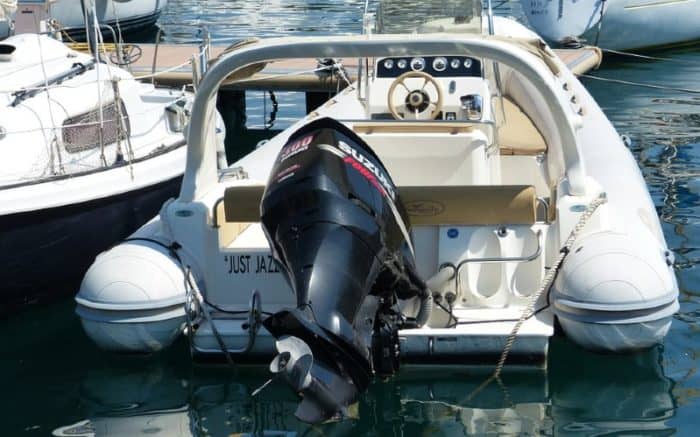
Obviously a sailing yacht won’t factor in here but motor yachts and hybrid yachts have very powerful engines because yachts tend to have a much higher gross tonnage than your average boat of even the same length. Keep in mind that some yachts, especially mega yachts, may have up to seven decks. You need a lot of power to keep that moving. Some of the biggest yachts in the world have a fuel tank capable of holding up to a million liters. That’s going to leave your normal outboard motors in the dust.
Boat Crew vs Yacht Crew

Yacht crews are often found wearing uniforms and have specialized training not just to run the vessel but also to see to the needs of the guests. Since yachts are often characters, the guests on board are like guests at a hotel and treated as such. Large yachts are a lot like a private cruise service.
Boats don’t always even need a crew and if a boat does have a crew it probably means the boat is a commercial vessel of some kind – think of a commercial fishing boat, for instance.
Boat Amenities vs Yacht Amenities

Here’s a place where boats and yachts often part ways significantly. There are some pretty luxurious houseboats and pontoons and cabin cruisers out there to be sure, but when you look at what you can get on a megayacht there’s barely a comparison.
The most expensive yachts have multiple helipads, swimming pools, tender garages that contain things like jet skis, gyms, high tech yacht electronics, massage rooms, bars, movie theaters, mini subs, discos, you name it. These really are like private cruise ships.
Now obviously it’s not fair to compare a 12 foot jon boat to the 600 foot Azzam yacht but these are clearly as different from each other as any two things can be. Yachts are known for their luxury and they can truly push the limits sometimes.
Yacht Locations vs Boat Locations

Smaller boats are obviously more capable of handling coastal and inland waters than any yacht you’re likely to find because that’s what they’re meant for. Yachts are typically, but not always, found in saltwater, usually around vacation destination areas like the Bahamas, the Mediterranean, Florida, tropical islands and so on. Boats are at home anywhere you find water.
There are definitely yachts on inland lakes like the Great Lakes, but they are decidedly less common.
Yacht Price vs Boat Price

Here’s where things get really different. You can get a little fishing boat for a few hundred dollars if you want. The Eclipse yacht cost $1.5 billion. So that’s the range we’re dealing with in terms of yachts vs boats when it comes to cost. If you try to meet in the middle with a 33 foot sport cruiser boat you might pay $200,000. But the average price for a yacht in 2021, and this means a vessel between 56 feet and 79 feet, was $1.1 million.
The Bottom Line
All yachts are boats but not all boats are yachts. In general, a yacht is a larger vessel that is used strictly for recreational purposes. It’s defined by its speed and its luxury and is often at the higher end of the price range. You tend to find yachts in popular vacation spots and they come in at an average price over $1 million.
Boats are generally smaller vessels and can be used for everything from fishing to cruising to commercial, police boats and military purposes. They can be extremely simple and, as a result, also incredibly cheap compared to yachts as well.
My grandfather first took me fishing when I was too young to actually hold up a rod on my own. As an avid camper, hiker, and nature enthusiast I'm always looking for a new adventure.
Categories : Boats , Yachts
Leave a Reply Cancel reply
Your email address will not be published. Required fields are marked *
Save my name, email, and website in this browser for the next time I comment.
More in Boats
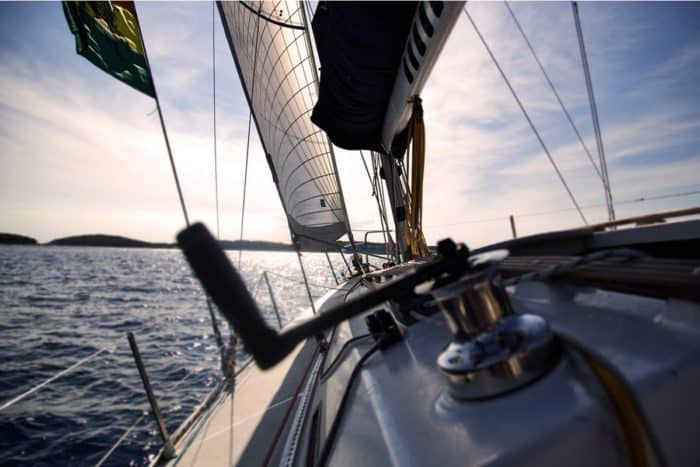
What Is A Gunwale?

131 of the Best Hawaiian Boat Names
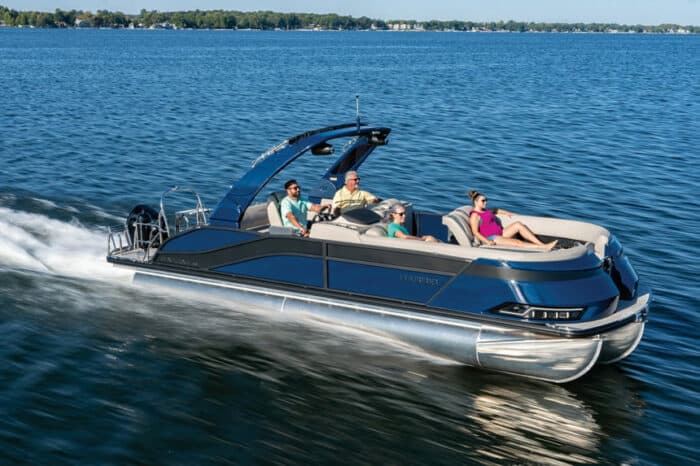
167 Patriotic Boat Names

The 138 Best Boat Names for Dog Lovers

The People’s Poncho Review and Ratings

Oru Lake Kayak Review

About Boatsafe
Established in 1998, BoatSafe is your independent guide into the world of boating, fishing, and watersports. We provide expert insights and detailed guides to help you find products tailored to your needs and budget.
Contact Boatsafe
- Address: 4021 West Walnut Street. Rogers, AR 72756
- Phone: (479)339-4795
- Email: [email protected]
Site Navigation
- How We Test
- Corrections Policy
- Privacy Policy
- Terms & Conditions
- Editorial Policy
- Affiliate Disclosure
Our Reviews
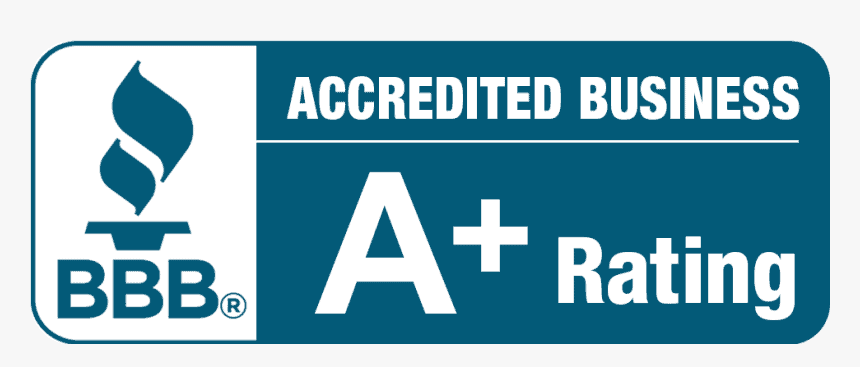
All content is © Copyright 2024. All rights reserved.
Click on the button to load the content from www.googletagmanager.com.
Load content

- Tailored Vacation Planner
- Cabin Yacht Charter
- Family Sailing Holidays
- Romantic Sailing Vacations For Couples
- Sailing with friends
- Greece all inclusive yacht charter
- Croatia all inclusive yacht charter
- Food & Wine Routes
- Yacht search
- Luxury sailing
Boat vs. Ship vs Yacht: What’s the Difference?

Language is a tricky thing, and picking out the differences between similar terms can be confusing. This is especially true when some of the definitions overlap. This is the case with the case of boat vs. ship vs. yacht . What’s the difference? We know in our gut that there are differences between these three seafaring vessels, but unless you’re a harbor master do you really know what counts as what?
Let’s get into some definitions, and we’re going to start with the easiest to explain: What is a yacht? What is a ship? And what is a boat?
Yacht vs. Ship vs. Boat
What is a yacht.
A yacht, I think everyone would agree, is fancier than a ship or a boat. “Yacht” infers some amount of luxury , and definitely recreation. There’s also something to be said about size. A yacht tends to be anywhere between 35 feet up to 160 feet. And some yachts, known as superyachts, go even beyond that. (Jeff Bezos just built a 417 foot yacht, but that’s really breaking yacht records.)
Because of the size, yachts tend to operate in larger bodies of water–generally the ocean. Yachts are able to handle rougher ocean waves, and they are also equipped with more advanced navigation and guidance instruments than smaller boats. Likewise, a yacht tends to have a full crew to help with the navigation, engineering, repairs, as well as having stewards that serve the yacht’s guests. This can be anywhere from a crew of four or five up to a crew of a few dozen on large yachts.
One interesting thing to note is that outside of the United States, a yacht refers to a sailboat , and a motorized yacht is called a “motor yacht”.
So, is a yacht a boat? Yes, technically a yacht is a boat. But a yacht is a very specific kind of boat.
Want to hop aboard?
Book your dream sailing vacation in top sailing destinations!
- Explore your charter options
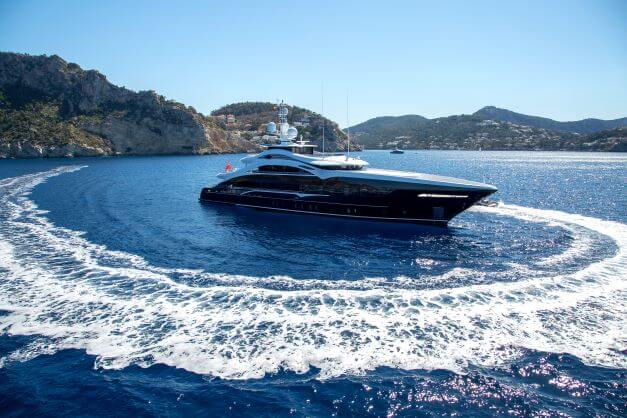
What is a Ship?
The term ship is most commonly associated with a very large boat, and something that is not as fancy as a yacht (one exception is that cruise ships can still be very fancy, but are referred to as ships because of their size and power.)
Ships are generally so large that they would never be found in a lake, with some exceptions for the Great Lakes, and are made for navigating the high seas of the open ocean. An ship can refer to a cruise ship, a naval ship, a tanker, a container ship, and many other commercial vessels.
Ships tend to have advanced navigation and technology, but much more advanced than that of a yacht due to the size, the speed, and the routes that a ship will take. They are meant to be traversing the open ocean for very long periods of time, from one continent to the next, while a yacht may only rarely set across the ocean and most often stays somewhat near land.
A ship will also have a much larger crew than a yacht or a boat. Ships are typically so large that they need not only one trained navigator but a set of navigators, plus an entire engineering team, and includes many more positions.
Finally, a ship is meant to carry things. This may be passengers, yes (in reference to cruise ships and some navy ships) but most ships are for carrying cargo–or even carrying equipment to do work on other ships including repair work or refueling.
What is a Boat?
Well, a boat is harder to define, because a yacht is technically a boat, and a ship is technically a boat. But when people refer to boats, they are almost always referring to something smaller than either a yacht or a ship. Boats may be motorized, like a speed boat, or they may sail, or they may be man-powered, like a rowboat or a kayak. Really, anything up to and including a liferaft, can be called a boat.
(As a side note that will just muddy the waters even further, submarine captains are adamant that their subs are boats. They are not ships.)
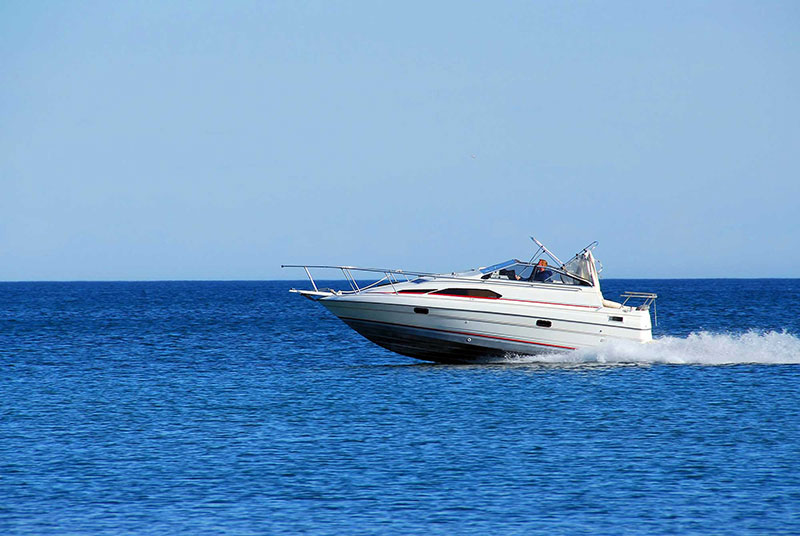
So, Boat vs. Ship Vs. Yacht?
Ultimately it comes down to this: all three of them are boats, but yachts are fancier, larger, and used for recreation, and ships are even larger, used commercially or by the navy, and are meant to cross oceans. The dividing line is sometimes thin, but generally speaking, when it comes to boats vs. ships.vs. yachts you can go by the adage “ I know it when I see it .”
Share article:
Have a question.
We have answers to your questions. So don’t hesitate to get in touch with our team today!
- GET MORE INFO
Feel free to ask us anything. All hands on deck. Let's sail
Thank you for sending us an inquiry, thank you so much for your enquiry.
- Yachts for Sale
- Sales Report 2024
- FAQ – Luxury Crewed Yacht Charters
- FAQ – Bareboat charters
- FAQ – Sell your Boat
- FAQ – Buying a Yacht
- How Much does it Cost to Charter a Luxury Yacht?
- All Blog Posts and News
- Yachting for beginners
- Indian Ocean
- Mediterranean
- Sales & New build
- Motor Yacht
- Event & News

Yacht Vs Boat: What is the Difference?

Definitions of words such as “yacht”, “boat”, or even “ship” are not always clear. Most of us make our own (unspoken) rules up, while others simply go with the flow and call their vessel whatever comes up at the moment.
So when does a boat become a yacht? Are all boats yachts? Are all yachts boats? What about ships?
Here is our subjective take on this vital matter.
The definition of a boat
In spoken or written English, it seems that anything able to float can be called a boat . It has little to do with size, function, or fit-and-finish. It is the most general term.
According to many dictionaries, boats are defined as “small vessels for traveling over water, propelled by oars, sails, or an engine”. So, a boat can have recreational purposes as well as commercial ones, but it is expected to be quite limited in size.
A yacht : our unofficial definition
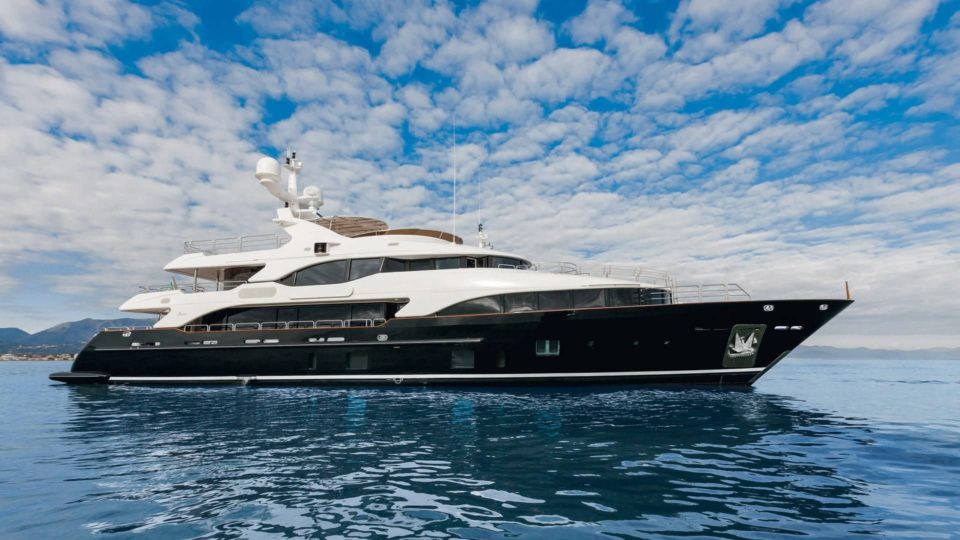
The word “yacht” generally refers to a more sophisticated craft than a boat or a ship.
Yachts can be sailed or motorized: so catamaran, monohulls, or even trimarans can also be called “yachts”.
To deserve their name, they have to be comfortable, spacious, well equipped and built with luxury in mind.
Regarding their functions, yachts are purely recreational.
They are designed for relaxation and leisure first, even though they can be suitable for long stays at sea and transatlantic crossings.
To sum up, as soon as your boat is a certain size and boasts several luxury features designed for leisure, then you can call it a yacht.
The definition of a ship
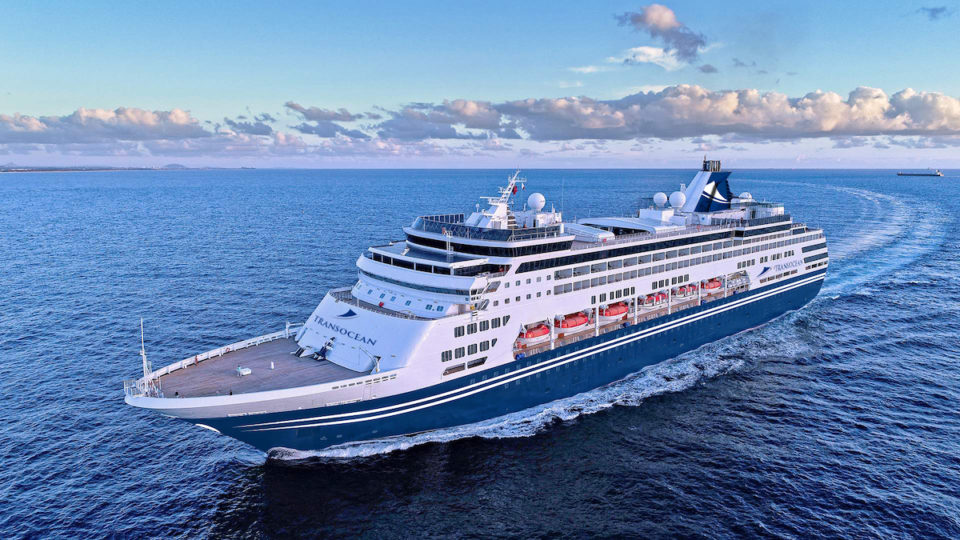
According to the Oxford dictionary, a ship is “a large boat for transporting people or goods by sea”.
The ship is associated with something larger and less fancy than a boat.
It is a “working” vessel, unlike yachts which are made for leisure purposes.
A ship usually needs a full crew to operate. A yacht might need a full crew to operate depending on its size. A boat usually implies smaller vessels and therefore most of them don’t need a crew.
Common vessels that are called “ships” include ferries, petrol tankers, or warships.
Details to look at to know if you are dealing with a boat, a yacht, or a ship
The size: one of the strong factors to identify a boat vs a yacht.
Size is one of the most determining factors to know how to call your vessel.
A boat is often expected to be smaller than a ship or a yacht. Generally, a vessel anywhere from 15-30 feet in length will be called a boat.
Starting from 15 meters (50 feet), private luxury recreational crafts can be considered yachts.
Starting from 24 meters (79 feet), you are entering the superyachts area.
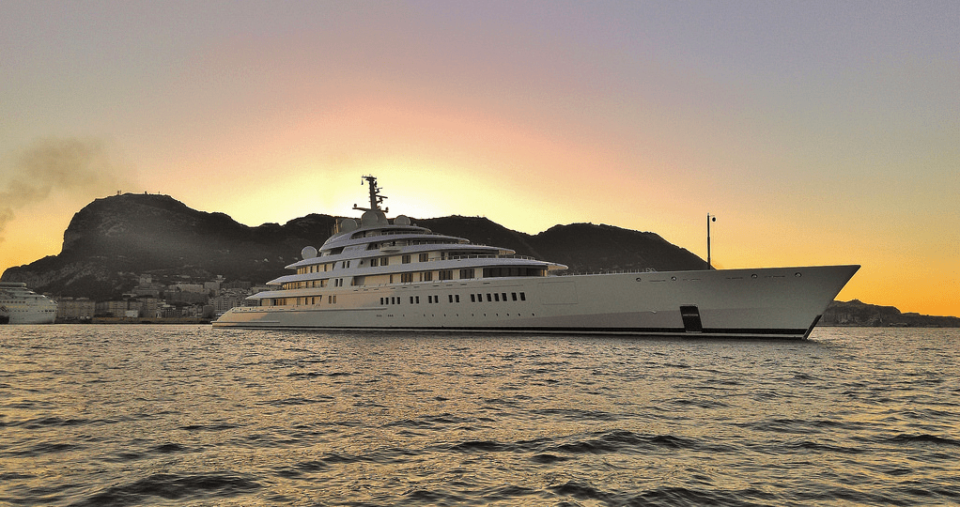
Above, 50 meters can start talking about mega yachts. Obviously, there is no upper limit to mega yachts. Currently, Azzam, the world’s biggest yacht is 180 meters long (590 feet).
So when it comes to differentiating between boat and yacht, size does matter.
But size alone isn’t enough to know the sort of vessel you are dealing with.
The function of a yacht vs a boat isn’t the same
The main function of its vessel is one of the easiest ways to recognize a boat from a ship or a yacht.
Boats can be used for both leisure and business (fishing, day trips, police, …) depending on their size and options.
On the other hand, a yacht has a purely recreational function. Unlike a “boat”, it can be used for long voyages on oceans thanks to its larger size, better propulsion, advanced electronics, guidance, and safety equipment, but especially thanks to its comfort. Yachts can protect passengers from bad weather and the comfortable cabins can accommodate several passengers for long stays. Yachts are also often available for charter with a staff taking care of the guests at a high standard of comfort.
Ships primarily have commercial functions. It can be forwarding freight, crossing the sea with thousands of people on board, or going on a warzone with a unit and its material.
To add to the confusion, some mega yachts such as Christina O could be called ships due to their initial function or their size.
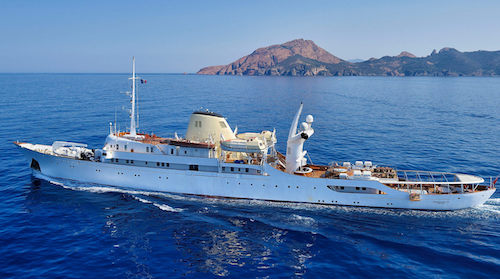
Besides these exceptions, it’s quite obvious to recognize a yacht from a boat or a ship simply by its size and the luxury of its amenities.
The luxury on board makes it a yacht or a boat
A yacht is a recreational vessel designed with luxury and comfort in mind.
The facilities, be it furniture, rooms, living spaces, safety equipment, and navigation systems are all luxurious on a yacht.
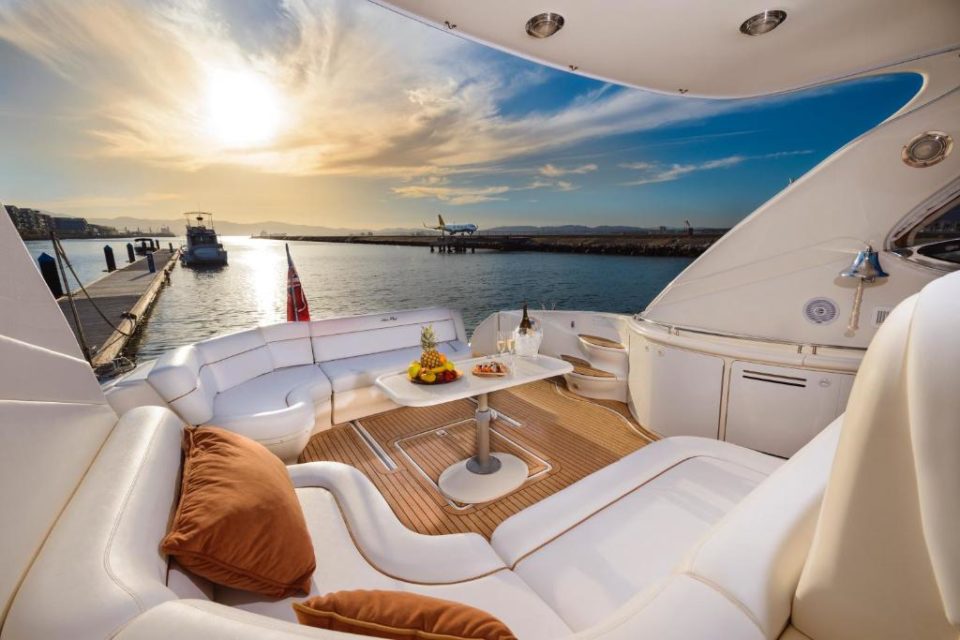
The notion of space is often very important to feel comfortable on board, even for long cruises. The largest and most luxurious yachts have various spaces such as beaches, sundecks … to make life on board as comfortable as on land, if not more.
To make it simple, if a vessel is luxurious, then more often than not, it’s a yacht.
Check out all our luxury yachts here.
The propulsion of the vessel can determine whether it’s a yacht or a boat
A boat can be rowed, propelled with its sails, or with one or several engines.
Motorized small boats can have impressive speed on the water thanks to their lightweight, but their engines are usually less powerful and sophisticated than yacht engines.
Some boats can sail long-distance when they are well equipped, such as solar panel, water maker etc.
On the other hand, equipment on yachts make them able to operate over very long distances, including crossing oceans.
Most ships are designed to cross the sea with safety and they are designed for this objective.
Looking at the propulsion is therefore not enough to know if a vessel is a boat, a yacht, or a ship, although it can give you a few clues.
The crew on board can tell the difference between a boat and a yacht
Commercial ships and professional boats obviously have experienced captains to sail them around the rough corners of the globe.
For yachts and leisure boats, it is less obvious.

Big yachts owners usually employ professionals to sail, but also manage the daily operations onboard. The number of enrolled crew members depends on the yacht’ size.
Usually, boats do not need a professional enrolled skipper to operate, if you know how to sail. But you can always rent a boat and hire a skipper to bring you wherever you want.
So, what should you call your vessel?
To make it simple, if your vessel is a luxury craft above 50 feet, designed for fun, recreation, relaxation, and comfort, then call it a yacht.
Anything below that size, call it a boat.
If you own a working craft rather than something recreational, especially if it’s a long vessel, then you are free to call it a ship.
But let’s be honest, nobody will blame you if you use the wrong term. You are entirely free to continue calling your canoe a yacht if you like it that way!
Read Also : How Much does it Cost to Charter a Luxury Yacht?
Starting from 50 feet (15 meters), a pleasure boat is usually considered a yacht.
Yes, a 40-feet boat can be considered a yacht if it has recreational use and a luxurious outfit. Otherwise, it is only a boat!
By definition, a ship is a large vessel that crosses oceans and other deep waters for commercial purposes. It carries cargo or passengers or performs specialized missions, such as defense, research, and fishing. So a boat becomes a ship when it is big, it weighs at least 500 tonnes or above and it has commercial use.
Private recreational boats from 33 feet are actually yachts. Luxury is also an important point once defining a yacht.
No. If the boat doesn’t have a recreational purpose, if it is below 33 feet long (10 meters), or if it is not luxurious, it is not a yacht but a boat!
RELATED ARTICLES MORE FROM AUTHOR
Luxury yachts for charter perfectly suited for 10 guests, skipper’s job and responsibilities: what you should know, trimaran vs catamaran: what are the differences.
- Testimonials
- Privacy Policy

Yacht vs. Boat | What’s The Difference?
So, we have boats and yachts. At first glance, they both float on water and seem like a great way to spend a sunny day. But look a little closer, and they begin to show their true colors. Think of boats as the regular bicycles of the sea world: they’re handy, straightforward, and get the job done.
Great for short rides or quick tasks. On the other hand, yachts are like those luxury cars you see in movies. More significant, flashier, and packed with all sorts of fancy stuff. They’re for those who love comfort and style on their sea adventures. While both have charm, they serve different purposes and offer unique experiences. Dive in with us as we explore the watery world of yacht vs. boat !
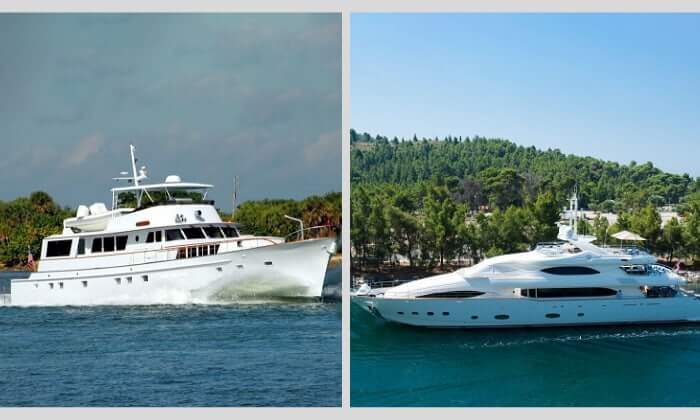
Overview of a Yacht
A yacht is designed primarily for leisure and recreational use, distinguishing it from working vessels like fishing boats or cargo ships. While yachts can be sailed or motor-driven, they are commonly associated with luxury, comfort, and prestige.
What Size Boat is Considered a Yacht?
The classification of yacht vs. boat is more about design and purpose than strict size parameters. However, in general terms, 30 feet (about 9 meters) and longer boats are called yachts.
- Super Yachts : Typically, vessels over 79 feet (24 meters) fall into this category.
- Mega Yachts : These are often over 164 feet (50 meters) and represent the pinnacle of luxury and size in yachting.
Commercial Purposes of Yachts
While yachts are primarily associated with personal leisure, they can also serve commercial purposes:
- Charter Yachts: Many yacht owners lease their vessels as charter yachts, providing vacationers with luxury experiences on the water. Such charters can range from day trips to weeks-long voyages.
- Yacht Races & Events : Yachts, especially sailing ones, participate in races and regattas, which can attract sponsorship and media attention.
- Training & Certification : Larger yachts requiring professional crew leads to commercial ventures offering maritime training, certification, and placement services.
Overview of a Boat
A boat is a watercraft of various sizes and types, designed to float or plane to provide passage across water. Using primarily for recreation, transportation, and specific tasks, boats serve as invaluable tools and leisure companions worldwide. Here’s a deeper look into what boats encompass:
Size and Types:
While there’s no strict demarcation on size, boats tend to be smaller than yachts, often under 30 feet (around 9 meters) in length. Boats come in various designs and serve multiple purposes:
- Fishing Boats : Designed primarily for angling activities, they often have storage, bait wells, and rod holders.
- Sailboats : Relying on sails for propulsion, they come in many varieties, from single-sailed dinghies to multi-mast schooners.
- Speedboats : Built for speed and agility, these are often used for racing, watersports, or leisure cruising.
- Rowboats : Powered by human effort using oars, they’re commonly found in calm lakes and rivers.
- Kayaks & Canoes : Narrow watercraft primarily used in rivers, lakes, and coastal areas.
Usage and Function:
Boats serve a myriad of functions:
- Recreation : From tranquil fishing trips to adrenaline-filled watersports, boats offer various recreational activities.
- Transport : Especially in archipelagic or coastal regions, boats provide essential transportation between islands or short distances.
- Occupation : Many rely on boats for their livelihood, from fishing to tour guiding.
- Rescue : Lifeboats and other specialized vessels play critical roles in rescue operations in water bodies.
- Sport : Boating competitions, from kayak races to sailboat regattas, are famous worldwide.
Sea Vessels Explored: Difference Between The Boat vs. Yacht
1. size: the defining dimension.
Boat: Boats are the compact vehicles of the maritime domain. They typically measure under 30 feet, providing just enough space for basic amenities and functionalities. Yacht: Contrasting starkly with boats, yachts are the giants of the seas. Starting from 30 feet, they often venture into the territory of super-yachts that stretch beyond 200 feet.
2. Propulsion Operations: The Power that Propels
Boat: How do boats move? The answers are as diverse as the boats themselves. Some rely on human power, like rowboats with oars. Others harness the wind using sails. Many modern boats, especially those used for recreation, utilize outboard motors.
Yacht: Yachts present a more complex picture when it comes to movement. Their larger structure necessitates sophisticated propulsion systems.
3. Use: Function Meets Passion
Boat: A boat’s purpose is as varied as its type. Need to fish? Boats have you covered. They also serve specific tasks, like towing or participating in water sports, ensuring a boat for almost every water-bound need.
Yacht: Yachts are less about function and more about experience. Imagine cruising through azure waters, anchoring beside secluded beaches, or hosting lavish parties amidst the ocean’s vastness.
4. Luxury and Comfort: The Glamour Quotient
Boat: Boats are built for a purpose. Their designs are straightforward, keeping in mind the core function. While some modern boats incorporate creature comforts like cushioned seating or basic entertainment systems, they’re not about luxury.
Yacht: Luxury is the essence of a yacht. It’s not just a vessel; it’s a floating piece of art equipped with modern luxuries. Think of gourmet kitchens, state-of-the-art entertainment hubs, jacuzzis with ocean views, and staterooms rivaling five-star hotel suites. Larger yachts may even feature helipads, cinemas, and gyms, making them floating mansions.
6. Price: The Investment Spectrum
The cost comparison of Yacht vs. Boat is as:
Navigating the Importance of Distinction
Why is it so essential to understand these differences? Here are some reasons:
Investment Implications: Discerning between a boat and a yacht helps potential buyers gauge their investment, from purchase and docking fees to long-term maintenance.
Operational Skills: Larger vessels like yachts demand a more profound understanding of maritime navigation. Some regions even mandate professional licenses or crew for yachts, reflecting their complexity.
Matching Maritime Ambitions: Identifying the right vessel type ensures that one’s nautical aspirations — fishing, luxury cruising, or weekend family outings — are adequately met.
Boats vs. Yachts: Insights from the Crew’s Perspective.
For Boat:
Yachts vs. Boats: A Nautical Choice
Deciding between a yacht and a boat isn’t just picking a watercraft; it’s about embracing distinct water-bound lifestyles. This choice goes beyond mere selection—it dives deep into the unique vibes, moods, and values that each vessel radiates—both present enchanting seafaring experiences tailored to individual desires and dreams.
Yachts are synonymous with opulence, style, and the magnetic charm of the open ocean. They offer expansive spaces and state-of-the-art facilities and are perfect for hosting grand get-togethers. When a yacht anchors, it silently broadcasts its owner’s love for deluxe experiences and refined living.
On the flip side, boats resonate with liberty, straightforwardness, and closer communion with aquatic wonders. They’re for those who love the undiluted thrill of water escapades, be it a serene fishing day on a secluded lake or meandering through a winding river.
Yacht vs. boat beckons with the charm of open waters, but they’re designed for different adventures and needs. Think of boats as your go-to for practical tasks or quick getaways, while yachts are all about diving into luxury, relaxation, and unforgettable sea escapades. So when you see a vessel cutting through the waves next time, you’ll know if it’s a simple boat doing its thing or a grand yacht making a statement.
FAQ’s
Q: What Is the Difference Between a Yacht and a Boat?
A: A yacht is a more extensive and more costly form of watercraft than a standard boat. It is frequently utilized for luxury reasons, such as relaxing or sailing around the Mediterranean. In contrast, a boat is a broader phrase that can apply to any watercraft.
Q: When does a boat become a yacht?
A: Yachts are often more significant than other forms of leisure boats. However, there is no hard and fast line between categories. Nonetheless, the widely accepted point at which a boat might begin to qualify as a yacht is roughly 35 feet, but they can easily be more extended.
Q: Is every boat a yacht?
A: While there is no legal criterion for a boat to become a yacht, anything longer than 40 feet might be termed a yacht, furthermore, you will most likely enter the “mega-yacht” or “superyacht” area when you increase in size.
Leave a Comment Cancel reply
Save my name, email, and website in this browser for the next time I comment.

Ship Gadgets
Enrich your shopping list wisely.
What’s the Difference Between a Boat and a Yacht – Boat vs. Yacht
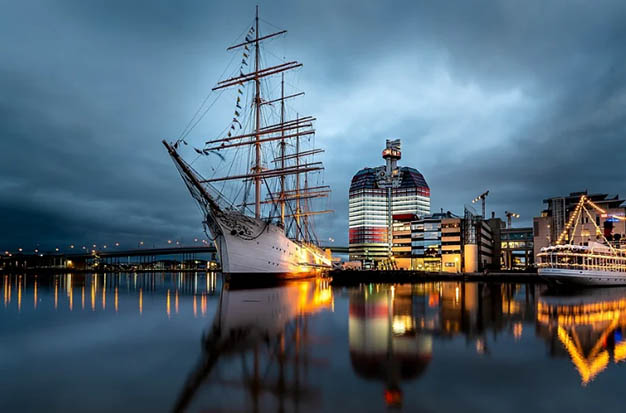
By definition, a boat is “a vessel for transport by water,” “a small yacht,” or “a vessel of any size built for navigation of rivers or inland bodies of water.” In everyday speech, a “boat” can be any watercraft, from a canoe to an ocean liner, that is used for transportation.
As can be seen from the variety of terms that include the word, such as a sailboat, motorboat, fishing boat, rowboat, tugboat, paddleboat, and lifeboat, the word “boat” is frequently used to refer to watercraft of all sizes and types in this kind of informal and general usage.
The term “yacht,” in contrast, is typically used to describe a large, ocean-going vessel propelled by numerous sails or engines.
Table of Contents
Difference Between A Boat And A Yacht
Operational areas of yacht and boat.
The operational areas of a boat and a yacht are significantly different. Yachts are watercraft used on the high seas and in oceanic environments. They typically consist of cruise ships, naval ships, tankers, container ships, RoRo ships, and offshore vessels. They were designed primarily for shipping goods and people across oceans.
On the other hand, boats—which can be used for towing, ferrying, paddling, kayaking, canoeing, patrolling, and more—can operate in smaller or more constrained water areas. Boats are primarily used in areas close to the coast for smaller tasks.
Size Of Yacht And Boat
The size is the primary factor taken into account when determining the distinction between a ship and a boat. It is said that the best way to differentiate between a ship and a boat is to remember that “A boat can travel with a ship, but the reverse is also true.”
Technically, a yacht is defined as a mode of water transportation that weighs at least 500 tonnes. In contrast, boats are required to have relatively small structural sizes and displacements.

Cargo Capacity Of Yacht And Boat
A boat is a small to medium-sized vessel with significantly less cargo-carrying capacity than a ship.
Unlike boats, which can refer to a variety of watercraft, ships are designed specifically to transport cargo, passengers, or other vessels. Boats are primarily used for pleasure, transporting people, or fishing.
Construction And Design Of Yacht And Boat
Yachts are complex structures with many different mechanical systems and design elements for the stability and safety of the ship.
A boat is much easier to build and has fewer complicated machines and designs.
Navigation And Technology Of Yacht And Boat
Boats are straightforward technologically, with less complex systems, equipment, and maintenance requirements. Because ships must be able to operate for longer periods of time and cross oceans, they are manned using sophisticated engineering, powerful machinery, and navigational systems.
Crew Of Yacht And Boat
One of the main distinctions between a yacht and a boat is this. Due to their size, ships require highly skilled engineers and navigators to operate them. A ship needs a captain to command it and direct the crew.
On the other hand, a boat’s crew size is based on its size. Depending on the size and purpose of the boat, there may be just one or a full crew.

Propulsion Of Yacht And Boat
A ship has specific engines to propel them, whereas a boat can be propelled by a motor, sails, or human power. (Yachts can also be propelled by sails or other advanced propulsion technologies)
Submersible vessels are categorically referred to as “boats,” despite the fact that all ships that are used on the high seas are called ships.’
This is primarily due to the ability of submersible vessels to be hoisted on ships during earlier centuries until they were needed for use in naval operations.
However, when discussing the distinctions between a yacht and a boat, boats that float on the water’s surface are primarily taken into account.
The way a term like “ship” or “boat” is used also depends on the area in which it is used. People from various nations frequently refer to a medium-sized fishing boat, ferry, or recreational boat as a ship. As can be seen, people have a propensity to generalize about a vessel based on its size.
It is important to keep in mind that, as mentioned above, there are a number of variables that determine the distinction between a yacht and a boat.
Final Words
Watercraft that we typically associate with the category of “ship” includes cruise ships, container ships, aircraft carriers, destroyers, tall yachts, and frigates. These huge yachts are all built to withstand potentially protracted ocean voyages. Traditionally, they required a very large crew of experienced sailors to manage them, though some, particularly container ships, are becoming easier to run with only a small crew. This has occurred in part as a result of improved mechanization and the development of sophisticated computer systems. They can also transport a lot of passengers, cargo, or a combination of the two.
Because early submarines could be hoisted on board a ship, they are technically categorized as boats. Modern submarines in distress can also be lifted and towed by a number of specially equipped submarine rescue ships, but they cannot be lifted on board. Powerboats, rowboats, canoes, kayaks, umiaks, catamarans, and tugboats are some of the more prevalent types of boats. They are not nearly as capable of carrying as much cargo as ships, but they are usually easier to maneuver. Additionally, boats lack the capacity for lengthy voyages, and some will struggle on the open sea.
Leave a Reply Cancel reply
Your email address will not be published. Required fields are marked *
Save my name, email, and website in this browser for the next time I comment.
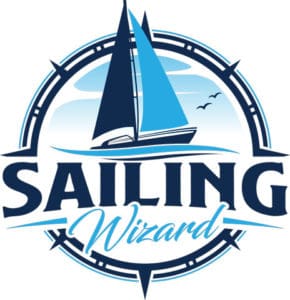
What’s the Difference Between a Boat, Yacht & Ship?
Whether you are a brand new sailor or just wanting to brush up on some terms, it is essential to know what to call a particular watercraft if you’re going to fit in while you’re at the docks or out on the water. There are many nuances and subtle differences between water vessel types, but below are some of the main differences.
In general, yachts are either sailing or motor vessels used for pleasure. Yachts are often luxurious and equipped with an overnight cabin. Boats can be either propelled sail or a motor and come in varying sizes. On the other hand, ships are usually motor-powered and much larger than boats.
Some of the differences between watercraft types can be a little fuzzy, but once you grasp the main differences between them, it becomes relatively easy to tell them apart. If you have no previous knowledge of watercraft, you are likely very confused about what defines a yacht, boat, and ship, so I’ll try to clarify any confusion you might have in the next few sections.
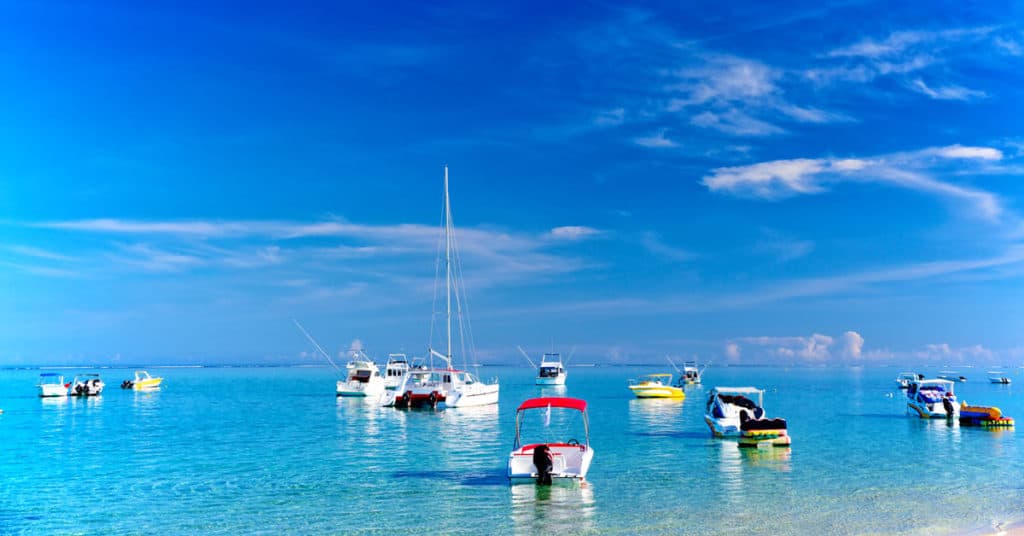
Similarities and Differences Between Boats, Yachts, and Ships
The many bodies of water all over the world are home to an extensive collection of different watercraft. There are so many shapes and sizes that they come in that it is nearly impossible to fit every single one into a specific classification.
However, in the following table, I did my best to loosely define ships, yachts, and boats so that it is easy to see the differences between the types of watercraft.
As I mentioned earlier, it is impossible to fit EVERY SINGLE water vessel into a particular category, so there are tons of exceptions out there. In addition to the exceptions, different organizations, laws, and people classify types of boats slightly differently.
There is no universally accepted definition for ships, boats, and yachts, but instead many different sets of rules and regulations. In this article, I have tried my best to use the most commonly accepted definitions for each watercraft type.
Now that we’ve gone over some of the main differences and similarities between boats, ships, and yachts, let’s take a look at each type of vessel individually and look at their most prominent characteristics and attributes.
What Exactly is a Boat?
Boats come in a vast array of sizes and shapes. To many people, the term “boat” simply refers to nearly any watercraft, but there are actually a few restrictions and defining characteristics that all boats have. So let’s just get right into it and take a quick look at what exactly qualifies a vessel as a boat.
Overall Size of Boats
As I said before, there is a massive catalog of different types of boats, and they come in a variety of sizes. There are huge boats that hold lots of cargo or people, and then there are smaller ones that barely can stay afloat with a single person on board.
Typically, boats are defined as watercraft that are less than 197 feet long. However, most boats you are likely to encounter on the water are usually around 30 feet long.
General Price Range of Boats
Again, it is hard to accurately give a price range for all boats because they come in so many different sizes, styles, and types, but most modern boats seem to fall in the $1,500 to $100,000 range.
Small Jon boats can cost even less than $1,500, while large sailboats and houseboats can cost well above $100,000.
Most Common Uses of Boats
Boats are used all over the world for a variety of different reasons and to do many tasks. Many types of boats serve a wide range of uses, but most are primarily used as a residence, for pleasure, or commercially.
Some of the most popular types of boats, such as sailboats, bowriders, and dinghies, are commonly used for enjoyment, fishing, racing, or other pleasurable activities. There are also many types of houseboats used as residences and commercial boats used for chartering or moving goods or people.
Propulsion Method of Boats
Due to the wide variety of boats, you are likely to find boats propelled by almost every propulsion method imaginable. Some of the more popular propulsion methods for boats to use are man-power, wind power, and motor power.
Boats on the smaller end often use the power of the people on board to row or paddle, while larger boats rely on sails or powerful motors attached to the stern. Many boats use more than one propulsion method, either together or with one of them as a backup.
What Exactly is a Yacht?
Yachts have many of the same attributes as boats, but their quality, size, and luxury really set them apart. When someone says “yacht,” many people imagine watercraft that are SUPER LARGE, and while there are lots of massive yachts, many smaller boats also qualify as yachts, which might surprise you.
Overall Size of Yachts
There are many different sized yachts, and the rules regarding how big they have to be are not very strict. In general, luxury watercraft greater than 33 feet in length are considered yachts. However, boats smaller than 33 feet are sometimes called yachts if they are exceptionally luxurious and elegant.
There is no upper limit to how large a yacht can be. Yachts longer than 100 feet are often referred to as mega yachts, and ones over 150 feet long called are super yachts.
General Price Range of Yachts
Because the very definition of a yacht requires it to be very luxurious, they often come with quite a price tag as a result. There is quite a range of different price points for yachts, ranging from $250,000 to $50,000,000 and beyond.
Most Common Uses of Yachts
Yachts, because they are so expensive to maintain and purchase, are primarily used for pleasure purposes. Day trips out on the water are typical for yachts, although they often have overnight cabins, so longer excursions are popular.
Chartered yachts are also very popular, which bridges the gap between commercial and pleasure. Although, when you are on a chartered yacht, it is usually for the sole purpose of having a great time and enjoying yourself.
Propulsion Method of Yachts
Because yachts are considered very luxurious and often so large, they are usually solely propelling using motor power. Even if a yacht is on the smaller end of the spectrum, they often only use a motor as a means of driving the craft through the water.
However, many large sailing yachts out there use sails and the wind to propel the vessel. So while the large majority of yachts use motors, keep in mind that some large and luxurious sailboats can be considered yachts.
What Exactly is a Ship?
Throughout history, large ships have been a helpful tool for many civilizations and have allowed them to transport goods and explore places beyond their homes. In modern times, ships are quite common and are used for a variety of different reasons.
Overall Size of Ships
One of the primary characteristics of ships that set them apart from boats is their size. Ships, especially in modern times, are often MASSIVE and are restricted to navigating only extensive waterways.
Vessels greater than or equal to 197 feet long are often considered ships. However, most ships today are huge and often fall in the 1,000-foot range or larger.
General Price Range of Ships
Most individuals will never own a ship due to their extreme maintenance and the cost of purchasing one. While many smaller ships are far less expensive, most modern ships cost anywhere between $50 and $500 million.
Large and luxurious cruise ships can even cost upwards of $1 billion to construct, and that’s not even taking into account staff, maintenance, and other costs.
Most Common Uses of Ships
Ships perform many different duties throughout the world, but usually, they are used to transport passengers or goods over long distances. In addition, they are also often used by military, scientists, fishers, and a plethora of other professions and people. They are also often used for pleasure purposes, in the form of passenger cruise ships.
Overall, ships encompass a large selection of vessels that perform many different duties.
Propulsion Method of Ships
Due to their large size, most modern ships are propelled using motors. However, even though ships are equipped with massive motors, they are still pretty slow and often move at around 20 knots per hour, although some move much quicker.
While most, if not all, ships today use motors to propel themselves through the water, this was not always the case. Before motors were around, many civilizations used ships for military, exploration, transportation, shipping, and many other uses. During these times, ships were powered primarily by man and wind power. Even today, you can occasionally find a sail-powered ship, though they are quite rare.
James Gerard
Hi, I'm James! I started sailing at a very early age here in the UK, and have enjoyed so many opportunities to sail all over the world. I created this website to share the many sailing tips I've leaned over the years, so that you can also discover the joy of sailing with safety and confidence.
Recent Posts
How to Predict Wind Direction & Speed from a Surface Pressure Chart
Learning how to read a surface pressure chart will allow you to predict the wind speed and direction based on the weather chart. This will help you in planning your next sailing trip.
What Does a Black & Yellow Buoy Mean? (Cardinal Marks Explained)
If you see a black and yellow buoy while you're sailing, don't ignore it. Cardinal Marks are there to help you avoid hidden hazards in the water. This helpful article will help you to identify a...

- Marine Engineering
- Yacht Services
- Yacht Surveys
- Yacht Electrician
- Megger Testing
- Marina Electrical Services
- Industrial Electrical
- Commercial Electrical
- Residential Building Electrical
- LED Lighting
- Industrial Lighting
- Electric Vehicle Charging Stations
- Sales & Parts
- Service Request
- Sales Request

- Privacy Policy
- Terms & Conditions
- RH Marine Group
What’s the Difference Between a Yacht and a Boat?

Many boating enthusiasts use the words boat and yacht interchangeably when in reality, they are very different terms. A yacht is a larger, recreational boat or ship. The word “Yacht” comes from Dutch origin and was originally defined as a light, and fast sailing vessel used by the Dutch navy to find and capture pirates. A boat, on the other hand, is smaller in size and can be anything from a fisherman’s boat to a sailboat.
When determining the difference between a yacht and a boat , there are a few main deciding factors including:
Size As previously mentioned, size matters when it comes to differentiating between a boat and a yacht. Yachts can range from about 35 feet in length all the way up to 160+ feet in length, however, most will be somewhere in the middle. Anything over 160 feet would be considered a “Superyacht”. Boats are generally anywhere from 15-30 feet in length.
Where they can operate Smaller boats are usually capable of operating in calm waters like lakes, rivers, and shallow harbors. Some larger boats, usually 20 – 30 feet in length, can also navigate more rough ocean waters. A yacht, on the other hand, is able to sail in deeper, ocean waters and deal with more turbulent seas. Due to a larger size, high tech yacht electronics and guidance instruments, protection from the elements, and a number of other features yachts are far more suitable for longer ocean trips.
Crew While a boat can be operated by just one captain, a yacht typically requires a full crew to help with navigation, maintenance, electronics and engineering, repairs and stewards to cater to the passengers. In reality, it’s a lot more like a small, private cruise service than an afternoon on the boat with your friends.
Propulsion Depending on the boat, it may operate solely using a sail and the wind, or one or more inboard or outboard motors. While some larger boats can mount very large engines to create some real speed on the water, these engines do not match the power of most yacht engines. Yacht engines are much larger in size, can produce considerably more power – in some cases up to 800hp, and are capable of running much longer distances.
Navigation and technology While some boats may have advanced marine electronics and navigation systems, it’s more of a requirement when it comes to yachts. When making trans oceanic trips it is not only important that you are able to navigate with precision, but also that you can detect other boats or objects that you may not be able to see and understand the performance of your vessel.
Tess Electric is a leading provider of marine electronics, marine electrical services , and marine engineering services to owners and crews of yachts and superyachts in Fort Lauderdale, FL. If you’re looking to work with an experienced team of marine electrical contractors, contact us today.
Recent Posts

We are a Marine Electrical Service Company servicing mostly in the Large Mega Yacht Industry and Marine Land Installations (marinas, resorts, apartments, docks, etc). We have mobile Technicians who cover the tri county area (Broward, Palm Beach and Dade) in their fleet of vehicles.

- Marine Electrical
- Land Division
- ShipServ Ship Supply
Our Services
- Fluorescent To LED Conversion
- All Land Services
- All Marine Services
Sales & Support
- Sales Request Form
Our Location
Tess Electrical LLC
“Boat” vs. “Ship”: Chart A Course To Understand The Difference
- Boat Vs. Ship
- Yacht Vs. Boat
Ahoy, me hearties! A true seadog worth their salt would never let aboard a landlubber who calls their ship a boat . That kind of mixup is the talk that gets you walking the plank!
In this article, we’ll sail the seven seas of nautical knowledge to define the difference between the words ship and boat , explain what they refer to in technical and casual use, provide examples of different kinds of both ships and boats , and we’ll even clear up the meaning of the word yacht .
🚢 Quick summary
In casual use, the word boat is often used to refer to any watergoing vessel, regardless of its size or how it’s powered. However, large oceanfaring watercraft—those that use multiple sails or engines—are more properly called ships . In contrast, the word ship isn’t commonly applied to smaller craft. The word yacht is typically used to refer to any larger noncommercial vessel—one used for sailing or other recreation, as opposed to business.
What’s the difference between a boat and a ship ?
By definition, a boat is “a vessel for transport by water,” “a small ship,” or “a vessel of any size built for navigation of rivers or inland bodies of water.” In casual use, the word boat is used to refer to any vehicle used to travel on the water—anything from a canoe to an ocean liner.
In this kind of casual and general usage, the word boat is often used to refer to watercraft of all sizes and types, as you can see in the variety of terms that include the word, such as sailboat , motorboat , fishing boat , rowboat , tugboat , paddleboat , and lifeboat .
In contrast, the word ship is typically reserved to refer to a large, ocean-faring vessel propelled by multiple sails or engines.
(Of course, the word ship is also used to refer to large, nonwater craft, such as airship and spaceship .)
In technical, nautical contexts, the word ship sometimes specifically refers to a sailing vessel that has three or more square masts. As is the case with boat , though, the word ship is applied in the name of a variety of large watercrafts, including cruise ship , cargo ship , pirate ship , battleship , longship , and steamship .
Go Behind The Words!
- By clicking "Sign Up", you are accepting Dictionary.com Terms & Conditions and Privacy policies.
- Name This field is for validation purposes and should be left unchanged.
In contexts where it’s important to distinguish the difference, the distinction made between ship and boat is typically based on the size of the craft being discussed and if it is used only for ocean or sea travel. Additionally, the word boat can refer to vessels that don’t have any sails or engines, such as a kayak or a rowboat, whereas the word ship usually refers to vessels with many sails or large engines. Even in casual usage, it’s very uncommon for someone to call a small craft a ship , unless they’re doing so jokingly.
One distinction made in nautical contexts is that the word ship often refers to vessels too large to fit inside other vessels. By contrast, the word boat is often used to refer to smaller craft that can fit inside larger ones. For example, a massive cruise ship may have a large number of lifeboats inside it.
What are you sailing? An ocean or a sea ? Learn the difference here.
Yacht vs. boat
The word yacht typically refers to a vessel used for private, noncommercial reasons (those other than business), such as sailing or racing. As a general term, the word yacht can refer to any watercraft that isn’t intended to be used to make money, which includes anything from racing sailboats to billionaires’ floating ultra-luxury mansions.
The word yacht is not used to refer to small vessels, such as row boats or canoes. In casual usage, a yacht may be referred to with the more general terms boat or ship , but certainly not all ships and boats are yachts .
What's the difference between "uncharted" and "unchartered" territory?
Trending Words
Commonly Confused

Word Origins
Current Events
Pop Culture
[ moh -d uh s op- uh - ran -dee, -dahy ]
- Email This field is for validation purposes and should be left unchanged.
Boat Virtue
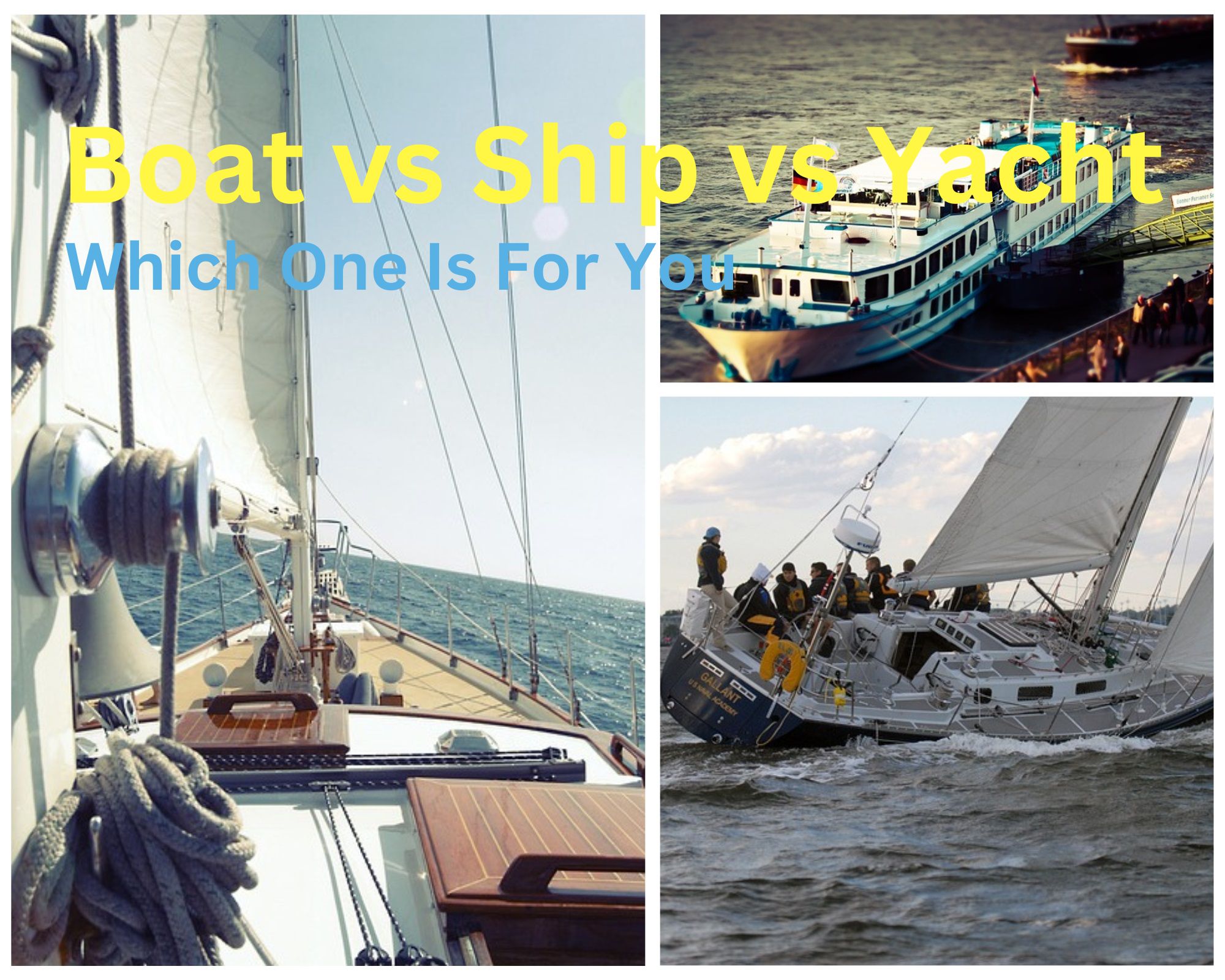
Boat vs Ship vs Yacht (6 Detailed Answer)
When it comes to nautical vessels, there are three main types that people typically think of: Boat vs Ship vs Yacht.
While all three can be used for transportation or recreation, there are some key differences that set them apart. Here’s a closer look at the distinct characteristics of boats, ships, and yachts:
Table of Contents
Boat vs Ship vs Yacht
When it comes to watercraft, there are three main types: boats, ships, and yachts. Each type has its own distinct features and purpose.
Boats are the smallest of the three types of watercraft. They are designed to float or plane on the water and are propelled by oars, sails, or a motor.
Boats are typically used for recreational purposes, such as fishing or pleasure cruising. Ships are much larger than boats and are designed for ocean travel.
They are seaworthy vessels that can transport people or cargo across bodies of water. Ships typically have a crew and passengers and may be used for commercial or military purposes.
Yachts are luxury vessels that are used for recreation or pleasure trips. They are typically much larger than boats and ships and are designed for ocean travel.
Yachts may have a crew and passengers, but they are not typically used for commercial or military purposes. Instead, they are used for leisure activities such as cruising, racing, or fishing.
Essentially, it comes down to size and purpose. Boats are small watercraft designed for recreation, ships are large vessels designed for transportation, and yachts are luxury vessels designed for leisure.
What Is A Boat
A boat is a watercraft of small to medium size designed to float or plane, propelled by oars, sails, or a motor.
Boats are typically found on inland waterways such as rivers and lakes, or in coastal areas. However, some boats, such as dinghies and inflatables, are designed for general recreational use.
What Is A Ship
A ship is a large, seaworthy vessel that is used to transport people or cargo across bodies of water. Ships are typically much larger than boats and are designed for ocean travel.
However, some ships, such as ferries, are designed for short-distance travel across smaller bodies of water.
What Is A Yacht
A yacht is a luxury vessel that is used for recreation or pleasure trips. Yachts are typically much larger than boats and ships and are designed for ocean travel.
However, some yachts, such as racing yachts, are designed for speed and may be used in competitions.
At What Size Is A Boat Considered A Yacht
A yacht is a boat that is used for pleasure, cruising, or racing. There is no definitive size for a yacht. However, in general, a yacht is considered to be a large and expensive vessel.
Yachts typically range in size from 40 feet (12 m) to over 200 feet (61 m). The largest yachts, known as megayachts, can be over 300 feet (91 m) in length.
Megayachts are typically owned by billionaires or wealthy families. Yachts are usually equipped with luxurious amenities and features.
Common amenities on yachts include staterooms, kitchens, dining areas, living areas, and hot tubs. Yachts also often have multiple decks, swimming pools, and helipads.
Some of the largest yachts even have their own private beaches. The term “boat” is a very general one that can refer to many different types of watercraft.
In common usage, a boat is usually smaller than a ship and is designed for personal or recreational use, while a ship is larger and is designed for commercial or military use.
However, there are also many types of boats that fall somewhere in between these two extremes, and the line between a boat and a ship can sometimes be quite blurred.
In general, the term “boat” is used to refer to any vessel that is smaller than a ship. This includes everything from canoes and kayaks to personal watercraft like jet skis.
Boats are often designed for specific activities, such as fishing, sailing, or powerboating. The term “ship” generally refers to any vessel that is larger than a boat.
Ships can be used for a variety of purposes, including transportation, storage, and recreation. Most ships are designed for commercial use.
But there are also many types of ships that are used for military purposes. The line between a boat and a ship can sometimes be quite blurred.
And there is no hard and fast rule about what makes a vessel a ship or a boat. In general, though, if a vessel is large enough to carry cargo or passengers.
Or is designed for use in open water, it is probably a ship. If a vessel is smaller and is designed for use in inland waterways or lakes, it is probably a boat.
And if a vessel falls somewhere in between, it might be classified as either a ship or a boat depending on its specific purpose or design.
Is a Cruise Ship a Yacht
It’s no secret that yachts are among the most popular vessels on the water. They’re luxurious, they’re fast, and they’re often seen as a status symbol.
But what about cruise ships ? Are they yachts? Technically, a yacht is a vessel that is used for pleasure, rather than for commercial purposes.
This means that cruise ships, which are used to transport large groups of people on vacation, do not technically qualify as yachts. However, there is a lot of overlap between the two types of vessels.
Many cruise ships are outfitted with all the same luxury amenities that you would find on a yacht, including multiple restaurants, bars, pools, and spas.
And just like yachts, cruise ships often have their own private cabins and suites, which are available for an additional cost.
So while cruise ships are not technically yachts, they definitely share a lot of the same features and amenities.
If you’re looking for a luxurious vacation experience on the water, a cruise ship is probably your best bet.

The Key Differences Between a Yacht and a Boat | Yacht vs Boat
Olivia benjamin.
- June 20, 2023

It’s a common misconception to assume that there is no difference between a yacht and a boat, but there are notable differences between these two types of watercraft. Yachts are generally larger and more luxurious than boats, typically smaller and designed for recreational activities such as fishing or water sports.
While yachts and boats serve as leisure vessels on the water, yachts often boast additional amenities like air conditioning, multiple bedrooms, and even hot tubs. Conversely, boats tend to have simpler features, such as a small cabin or storage space for fishing equipment.
Gaining a deeper understanding of these differences can assist you in determining whether to choose a yacht or a boat based on your unique needs and preferences. So, let’s dive deeper into the distinctions between these two types of vessels.
What is a Yacht and What is a Boat?
Boats and yachts are two terms that are often used interchangeably, but there are distinct differences between them. Let’s examine the differences between boats and yachts.
What is a Yacht?
You might think of a yacht as a luxurious vessel often used for leisure activities, like sailing the high seas or throwing lavish parties on board.
Yachts are typically larger than boats and have amenities such as multiple cabins, bathrooms, kitchens, and entertainment areas. They’re designed for comfort and style rather than speed or efficiency.
However, it’s important to note that not all yachts are the same. Some may be motorized, while others require sails to move through the water.
Moreover, there are several types of yachts, including racing yachts, cruising yachts, and mega yachts, with sizes ranging from 33 to over 160 feet. Each type caters to specific preferences and requirements, ensuring a tailored yachting experience.
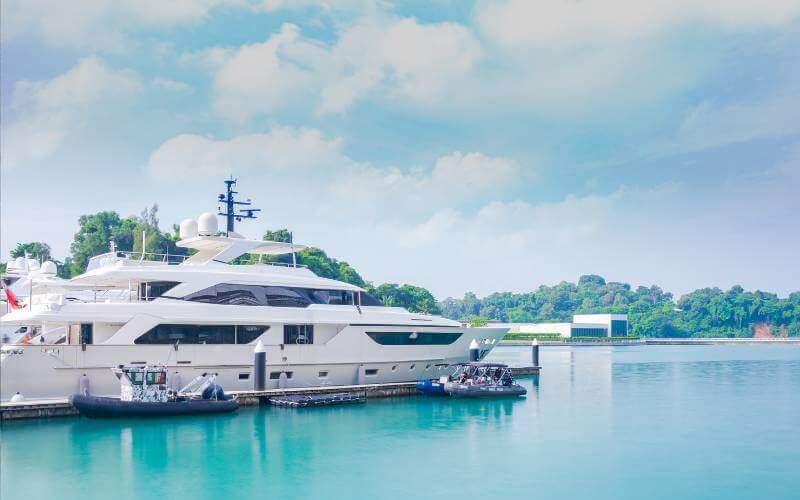
What is a Boat?
A boat is a watercraft primarily designed to float, move, and navigate on water. It is a generic term that refers to a wide range of vessels used for various purposes such as recreation, transportation, military, commercial use, or fishing.
Boats come in different sizes, designs, and types, each serving a specific need. Small boats like kayaks and canoes are used for recreational purposes, while larger boats like tugboats serve commercial purposes.
Whether used for pleasure or work, boats offer great maneuverability. They can navigate in shallow waters and tight spaces and come equipped with navigation and other systems.

Boat vs Yacht | What is the difference between a Yacht and a Boat?
Do you want to know the differences between yachts and boats? Well, there are several key points to consider.
A boat is a generic term used to refer to any small watercraft. At the same time, a yacht is a specific type of boat often associated with luxury and recreational purposes. Many differences exist between yachts and boats, including the use, size, construction of these vessels, and many more.
Let’s explore these differences in detail to help you understand the unique qualities of each type of watercraft.

Difference in Size
Yachts are typically larger than boats, often measuring over 40 feet long. While boats come in various sizes, they often range from around 20-30 feet in length.
Boats are usually smaller and built for leisurely activities like fishing or cruising on lakes and rivers. On the other hand, yachts are designed for luxurious living at sea and are often equipped with multiple cabins, bathrooms, entertainment areas, and even swimming pools.
The size difference between yachts and boats also affects their handling of the water. Due to their large size and complex systems, yachts require experienced crews to operate them. Boats, on the other hand, can be easily handled by anyone with basic boating knowledge.
Difference in Use
While both vessels are designed for water travel but serve very different purposes, boats are typically smaller vessels used for recreational activities such as fishing, water sports, and short trips along the coast. They’re also commonly used for transportation in areas with many waterways.
Yachts, on the other hand, are much larger and more luxurious than most boats. They’re typically owned by wealthy individuals or companies and used for leisurely cruising or entertaining guests. Some yachts can even be chartered for special events such as weddings or corporate retreats.
Difference in Technology
While many boats rely on traditional engines or rowing, yachts often incorporate cutting-edge navigation, communication, and entertainment technology.
For example, some luxury yachts have state-of-the-art autopilot, radar and GPS systems that easily navigate even the most treacherous waters. Additionally, many yachts are equipped with satellite phones and other communication devices that allow passengers to stay connected no matter where they are.
Conversely, boats have basic technology geared towards recreational purposes, like fish finders or depth sounders. Older boats may still use traditional analog instruments for compass bearing and navigation.
Regardless of size or purpose, one thing is clear – technology plays a major role in differentiating between a yacht and a boat.
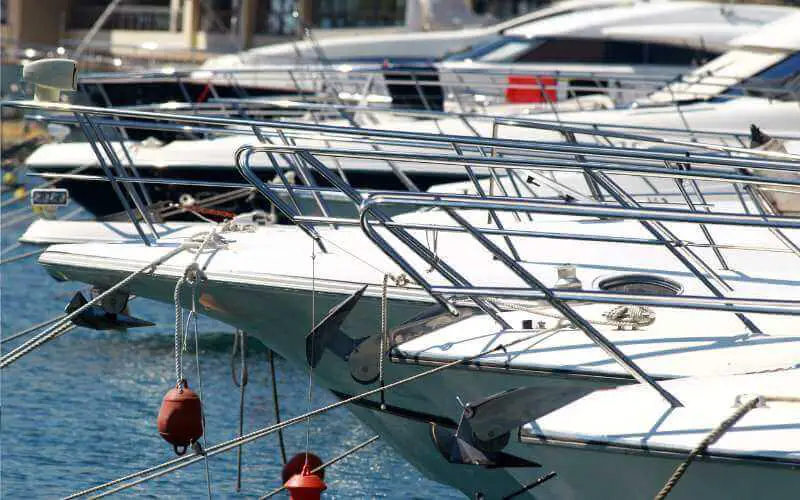
Differences in Power and Propulsion
When it comes to power and propulsion, yachts and boats have some key differences. Yachts are often equipped with larger, inboard engines designed for speed and endurance. In contrast, boats may have outboard motors that are smaller and better suited for recreational purposes.
Another key difference relates to the type of transmission used. Yachts often rely on multi-speed transmissions that allow the engine to operate at various speeds. Boats, on the other hand, may have simpler transmission systems that are designed for a lower level of performance.
The type of propulsion used is also important to consider. Yachts may be propelled by jets, controllable pitch propellers or other high-tech means, enabling them to perform well in various conditions. Boats typically rely on simpler propellers unsuited to more demanding environments.
Difference in Price
When it comes to price, yachts and boats are on opposite ends of the spectrum. Boats, being smaller and typically used for recreational purposes, can range from a few thousand dollars to a few hundred thousand dollars.
Yachts, on the other hand, are significantly more expensive. These vessels are often larger and more luxurious, costing several million to hundreds of millions of dollars.
The cost of owning a yacht goes beyond just the initial purchase price. Yachts require significant upkeep, including maintenance, insurance, and docking fees. However, yacht owners are often willing to pay high costs for the prestige and luxury of owning such vessels.
The Difference in Luxury and Comfort
Luxurious yachts have everything from plush interiors with high-end finishes to state-of-the-art entertainment systems. Many yachts also come equipped with luxurious bedrooms, bathrooms, and gourmet kitchens.
In addition to these features, yachts offer expansive decks and outdoor spaces for entertaining guests or simply enjoying the sun and sea breeze.
When it comes to luxury and comfort, there really is no comparison between a yacht and a boat. While boats may be functional for certain activities, such as fishing or water sports, they offer a different level of extravagance than you’ll find onboard a yacht.

Frequently Asked Questions
What is the cost difference between purchasing a yacht and a boat.
Before you set sail, remember, a yacht is not just a bigger boat. The difference between purchasing a yacht and a boat can be significant, with yachts typically costing millions while boats range from thousands to hundreds of thousands.
Are there any legal requirements for operating a yacht versus a boat?
To operate a yacht, you may need a captain’s license and have to follow specific regulations depending on the size of your vessel. For boats, requirements vary by state and type of boat but are generally less strict.
How does the size of a yacht compare to the size of a boat?
Yachts are generally larger than typical boats, ranging from 33 feet to over 160 feet in length. However, the size distinction between a yacht and a boat needs to be clearly defined and can vary depending on personal perception.
Are there any specific maintenance requirements for a yacht that differ from those of a boat?
Yachts require meticulous maintenance to ensure they remain seaworthy. This includes regular inspections, cleaning, and repairs. These tasks are more complex and costly than those typically required for boats but crucial for the safety of all onboard.
What is the largest yacht in the world?
As of 2023, the largest yacht in the world is the SOMNIO , measuring 222 meters (728 feet) in length. The yacht is under construction and due for launch in mid-2024.
A yacht can be likened to a floating mansion, replete with lavish amenities and luxurious features, often owned by affluent individuals who relish time at sea. These vessels boast multiple decks, spacious cabins, and even swimming pools.
In contrast, boats come in various shapes and sizes, ranging from small dinghies to large commercial tugboats. While some boats offer basic amenities like a small cabin or restroom, they cannot compete with the luxury of a yacht.
The primary distinction between a yacht and a boat lies in luxury and comfort. Yachts epitomize extravagance, providing amenities akin to a high-end hotel suite, while boats prioritize practicality and functionality.
Ultimately, choosing between a yacht and a boat depends on personal preferences and intended use.
Boat Collisions: How to Avoid Collisions with Another Boat
Boating can be a fun and relaxing activity that many individuals enjoy. Whether cruising along the coastline, fishing with friends,
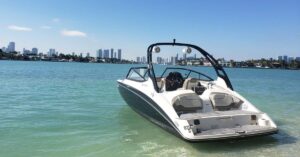
What is a Jet Boat? Propulsion System, Types, Pros and Cons
Jet boats are thrilling, high-speed watercraft making waves in the boating industry. Unlike conventional boats, a jet boat uses powerful

How to Steer a Boat: Mastering the Art of Boat Steering
If you’re ready to embark on a boating adventure and take hold of the helm, it’s time to dive into
Workshop Insider Newsletter
Be a workshop insider get our latest collection of news and announcements delivered to your inbox..., latest articles.
- September 12, 2023
The Ultimate Guide to Pipeliner Welding Hoods: Features, Benefits, Buying Guide, and Best Practices
- Welding Helmets Buying Guides
- September 11, 2023
- September 10, 2023
J-B Weld Removal: How to Remove JB Weld from Metal, Plastic, Skin, and More!
- Mechanical Engineering , Welding Technology
- August 19, 2023
- August 17, 2023
What are Bellows on a Boat: Everything You Need to Know
- August 16, 2023

- Privacy Policy
- Terms of Use
- Affiliate Disclosure

Boat vs Yacht: Main Differences in Size, Length, and Features
Can you tell the difference between a boat and a yacht? You should be able to if you’re a sailing enthusiast. If you can’t, then this post was made exactly for you. If you can tell the difference between the two, then use this article as a tool to verify if all that your sailing knowledge is correct.

When can a boat be considered a yacht?
The answer to this question is open to debate. But just so you know the general standard, a boat is already considered a yacht if it is already 30 feet long. A lot would debate though that more than the size, it is the style, elegance, and feel of a yacht that mainly differentiates it from a regular boat. A smaller boat can very well be considered a yacht if it has the right look and feel to it.
Yachts are more for personal use. Except for ones that are available for charter. If you’re interested in chartering one, you should consider contacting Simpson Marine yacht brokers .
What are the main differences between a yacht and a boat?
You can easily tell a yacht from a boat if you’d consider the following factors:
A yacht is almost always bigger than a regular boat. This is because a boat by definition is any water vessel or floating transport that can be stowed aboard a ship. A boat can be of any size. In fact, more technical guides provide that a boat is any floating transportation that does not go over 196 feet LOA.
Yachts are way bigger as they can be over 40 meters LOA. The richest of the rich privately own superyachts, megayachts, and gigayachts. Per 2019, the biggest recorded yacht is Azzam and it is owned by the President of the United Arab Emirates. It is 590 feet long. Azzam means ‘determination’ in Arabic.

2. Aesthetic
You don’t need to be a sailing expert to know the difference between the aesthetic of a regular boat and a yacht. Yachts have sophisticated designs that exude elegance and luxury. Boat designs don’t necessarily have such a look and feel. The feel of luxury possibly originated from the fact that it was Charles II of England who popularized the use of luxurious water vessels for personal use. In truth, you can simply say that if a water vessel exudes luxury and is more expensive with a sophisticated premium design, it is a yacht.
Boats are used for both commercial and non-commercial needs while yachts are almost exclusively used for personal use. Yachts are designed with luxury and personal pleasure in mind.
4. Amenities
A yacht is considered a recreational boat with several comfort amenities to entertain guests, such as a sophisticated entertainment system, tub, and creative lighting fixtures. Superyachts have swimming pools, sports courts, beach clubs, private cinemas, and even helicopter decks. On the other hand, boats don’t have many luxurious amenities found in yachts. Learn more about superyachts below.
What is a Superyacht?
There is no way to stop the birth of bigger and bigger yachts by the year. This is why we now have terms such as Superyacht, Megayacht, and Gigayacht. People often interchange Superyacht and Megayacht to refer to yachts that go over 40 meters of 130 feet LOA. Superyachts are usually owned by the world’s top millionaires.
Consider finding a secure yacht mooring facility such as Emerald Landing for your boat the next time you go for a boating experience.
Superyacht Sizes
You can expect to witness the birth of ever bigger yachts in your lifetime but do be guided by the following sizes when it comes to massive ones that already exist today:
Superyacht: Ranges from 120 feet to 200 feet Megayacht: Ranges from 200 feet to 300 feet Gigayacht: Anything that goes over 300 feet. With this standard guideline, you can consider the Azzam as a gigayacht.
Other Ways to Classify Yachts
Apart from size classification, yachts can also be differentiated when it comes to their many variations. The following are the most popular ones:
1. Weekender
A yacht is a weekender if it has at least one or two cabins with basic functions. Weekender cabins are usually small. Weekender yachts come with basic plumbing and a small kitchen (galley). A Weekender yacht can perfectly accommodate a few guests for two nights at most. Hence, its name.
2. Cruisers
A Cruiser is bigger and better than a Weekender yacht. It is equipped enough to accommodate many guests for long periods. With one, you can have a sailing holiday that can last for weeks or months. A Cruiser is fully equipped to allow for a comfortable long vacation. One can even live permanently in a Cruiser.
3. Day Cruiser
A Day Cruiser is a basic yacht with an open deck. It has no cabin and offers limited luxuries to guests. As it has no cabin, it cannot accommodate guests for an overnight stay. It is perfect though for afternoon sailing, gatherings, and celebrations by the deck. If you’re after a hassle-free afternoon sailing with family and friends, a Day Cruiser will be perfect for you.
4. Sport Fishing Yachts
A Sport Fishing Yacht is simply a Cruiser that comes with specialized features for fishing enthusiasts. It can come with more cabins. It comes with complete fishing equipment for extended fishing trips. Just like a Cruiser, it has a galley and basic plumbing. Sport Fishing Yachts can't cater well to numerous guests. It can however fully support an enjoyable fishing expedition. For a more in-depth understanding of Sport Fishing Yachts and how they enhance your fishing experience, learn more here.
Indeed, yachts allow you to enjoy exploring the beautiful scenery and adventure water activities like sports fishing during your weekend getaway or luxury vacation. Learn more about making fishing fun and easy at Fishing Outcast .
5. Racing Yachts
Racing yachts are not the most comfortable kind of yachts. It has stripped-down features that allow for speedy sailing. It only has basic amenities that can only cater to a few people. Racing yachts have light frames and heavy keels that allow for large sails.
6. Luxury Yachts
Luxury yachts are grand yachts . They come complete with luxurious amenities for extended holiday vacations that are fully comfortable and decadent. Luxury yachts are owned by the world’s richest who can easily decide to sail at any given time for however long they desire.
Buying Or Renting?
Buying a boat is cheaper than a yacht because of the high-end features that the latter provides. The same goes with renting. If you plan to rent, it’s critical that you choose a boat or yacht rental service that offers excellent customer service and emergency contingency measures. Check out this website for your boat rental needs.
Whether you plan to buy or rent a boat or yacht, conduct careful research, check the features, and compare the sellers or rental services in terms of cost, service warranty, and technical support.
Knowing the main differences between a boat and a yacht can help you decide on the best one to use for your next water adventure. Whether you plan to go island hopping, fishing, or cruising to celebrate milestones , determining the essential factors when choosing a boat or a yacht will help you create more unforgettable and enjoyable experiences.
More Random articles you might enjoy

Leave a Reply Cancel reply
Your email address will not be published. Required fields are marked *
This site uses Akismet to reduce spam. Learn how your comment data is processed .

Community Features
Get traveling, backpacker 101.

Houseboat Vs Yacht (Differences & Comparison)

August 30, 2022

This article may contain affiliate links where we earn a commission from qualifying purchases.
For most people, a houseboat and a yacht refer to the same thing. But is that the case? This houseboat vs. yacht comparison guide has the answer.
If you are looking to spend some of your time living on the water, you can either purchase a houseboat or a yacht. After all, they are the same thing, right? Not exactly. Houseboats are yachts are two different water vessels.
A houseboat is more of a floating house. It’s specifically built for permanent residence in water. And while it can move around, most houseboats spend the majority of their time moored to a port. Yachts, on the other hand, are designed for leisurely water activities like racing and vacations.
In this houseboat vs. yacht comparison guide, we will take a closer look at how these two water vessels compare. We will explore their designs, the different types available, their floor plans, and their pricing. And by the time you finish reading this guide, you will have a clear idea of the differences between a houseboat and a yacht. Also, this guide will help you to know the right choice for your needs.
We aim to provide our readers with informative, well-researched, and trustworthy content. And this is made possible thanks to our ever-dependable team, composed of respected journalists, experienced researchers and various other experts, drawn from different specializations. So, whenever you come across any type of content piece on our site, you can rest assured that the information you are getting is credible.
Table of contents
One of the main differences between a houseboat and a yacht is their design or appearance. If you take a closer look at a houseboat, you will notice it resembles something that looks like a floating home. And this explains why it’s called a houseboat. It’s a combination of a small house and a boat, thus the name.
A yacht, on the other hand, looks like an ordinary boat. Hence, it’s almost impossible to confuse the two, in terms of appearance, since they are considerably different.
A notable difference in their appearance is the hull. Considering that different water vessels come with different types of hulls, this is also the case with these two. For a houseboat, you will notice that it has a flat bottom hull. The flat bottom hull is designed to enhance its stability in the water since it spends the majority of its time docked alongside a pier, berth, or slip.
On the other hand, yachts come with V-shaped hulls. The V-shaped hull is designed to enhance the vessel’s agility and speed. Unlike houseboats, yachts spend most of their time moving around on the water. And this explains why they come with this type of hull design.
So, if you come across a water vessel that has a flat-shaped hull, it’s highly likely you will be looking at a houseboat. On the other hand, if it has a V-shaped hull, the chances are it’s a yacht or other similar water vessels built for agility and speed.
But, it’s also worth mentioning that some high-performance boats like tournament waterski boats also have flat-bottomed hulls. This hull design is to enable them to skim smoothly on the water surface.
Similar to other water vessels, houseboats and yachts come in different types, shapes and sizes. So, if you are looking to purchase any of these two water vessels, here are the different available types.
There are two main types of houseboats. These are static or non-cruising houseboats and bluewater or cruising houseboats. Each of these two types is built for a specific purpose and utilization.
Static Houseboats
As their name suggests, static households are not built for moving around. Most of the time, they are anchored or moored to a designated spot, which may be a dock or marina. Static houseboats are the most popular out there.
Non-cruising houseboats come equipped with almost all the modern conveniences that you would find in a normal house. However, these boats like propelling mechanisms, meaning you can’t move around in them.
Cruising Houseboats
A cruising houseboat is almost similar to a static houseboat, in terms of design and furnishings. But, it comes with a propelling mechanism, which may be a sail or engine. These are designed for individuals that want to travel around in a floating house. They are mainly built for vacationing.
But, as much as you can move around in a cruising houseboat, you can’t operate it on open or high oceanic seas, meaning you can only cruise with it on small water bodies. Cruising houseboats are not as popular as their static counterparts are.
While there are two main types of houseboats, you will come across numerous types on the market, branching from these two basic ones. Some of the different kinds of houseboats that you will find on the market include:
Pontoons are flat-looking cruising houseboats, mainly made from materials like wood, marine-grade aluminum, plastic, steel or fiberglass. They are mainly designed for vacationers. Pontoons are popular among houseboat lovers because of their practicality, stability and affordable prices. Also, they are easy and safe to operate and their maintenance costs are minimal.
Barges are large houseboats, which can be moved around or permanently anchored at the bay. Barges are the most popular houseboat styles due to their generous amounts of storage space. A conventional barge can accommodate approximately 10 people, making them ideal for families.
Trailerable
Trailerables are houseboats with a narrow and long design. Their narrow design makes them ideal for cruising small river systems and canals. Its name comes from the fact that you can tow it with a vehicle and move it around since it’s lightweight. Trailerables are smaller than the majority of other houseboats. But, if you only wish to spend a short amount of your time in the water, then a Trailerable will be the ideal vessel.
Floating Home
A floating home is a non-cruising houseboat, ideal for people who don’t want to cruise around in their boats. It’s a great retirement home for someone who wants to spend the majority of their time staying on the water. Floating homes are among the cheapest houseboats. They are affordable to build and easy to maintain.
River Houseboat
If you are planning to be living permanently on water, then you should consider building or buying a river houseboat. Houseboats are usually made of fiberglass. Also, they are customizable, meaning you can have them built according to your specifications. River houseboats and you can furnish them with various conveniences.
Full hulls are popular houseboats that you will mainly find in the U.S. Full hulls come with a spacious interior, meaning they can accommodate several people. And thanks to their design, they have higher buoyancy, meaning they can handle rougher waters better than most other types of houseboats.
Just like houseboats, yachts come in different types. Yachts can be categorized based on size and purpose, among others. Let’s take a closer look at the different yachts that fall under each of these categories.
When it comes to size, you can buy a smaller yacht, medium-size yacht, mega yacht or a super yacht. As you may expect, the bigger the yacht, the more it’s going to cost you to buy and maintain.
Smaller Yachts
Smaller yachts range between 10 meters to 20 meters. The majority of smaller yachts are usually privately owned. They are mainly used for water recreational activities like water sports or cruising. These yachts can be sail-driven, motor-driven or a combination of both.
Medium-sized Yachts
Medium-size yachts range from around 20 meters to 30 meters. They are ideal for tourist groups or bigger families. Medium-sized yachts may have a small crew for operating and maintaining them.
Super Yachts
These yachts measure around 30 to 50 meters long. They come with several nice features like sky lounges, Jacuzzis, bars and dining rooms. They can be sail-driven or motor-driven. Superyachts also have a professional crew for serving the people on board.
Mega Yachts
These are the biggest yachts currently. They are usually owned by super-rich individuals since they are quite costly. Some are also owned by organizations that offer water tourism. Megayachts measure around 50 meters long or even more. Similar to superyachts, mega yachts also have a dedicated crew that works round the clock. They are also adequately outfitted with numerous luxurious facilities and amenities like cafeterias, swimming pools, suite rooms, restaurants, gyms, conference banquets and pubs, just to name a few.
Different yachts are built for different purposes and target markets. Some of the different yachts that fall under this category include:
Cruiser Yachts
As their name suggests, these yachts are mainly built for moving around or vacationing. Cruiser yachts come in different types and sizes. They are built for long-distance trips. Luxury yachts usually fall under this category.
Sports Cruisers
These yachts are built for short fast traps and water sports activities. They are quite compact and smaller in size than most of the other yachts. And as you may expect, their accommodation spaces are also limited.
Fishing Yachts
Fishing yachts are purposely built for fishing and leisurely activities. They come with adequate space for storing fishing gear. These yachts come with open decks, to make fishing easier. While you can use them in various fishing spots, they are not allowed for deep-sea fishing.
Expedition Yachts
If you love exploring or touring using water vessels, then expedition yachts are the perfect fit for you. They are built for long-distance water trips and vacations. Expedition yachts are given permission to explore remote and uncharted locations, which is usually not the case with cruiser yachts.
Trawler Yachts
Trawler yachts are also fishing vessels. However, they are built for large-scale or commercial fishing. But unlike ordinary fishing yachts, trawler yachts come with some comforts like sleeping bunks, since the crew may spend several months fishing.
Comfort and Livability
You can live on both a houseboat and a yacht. However, yachts tend to be more expensive compared to houseboats per square footage. Therefore, for the average person, a houseboat provides the most practical, affordable and convenient option.
Houseboat Floor Plan
The floor plan of a houseboat resembles that of a conventional house. As for the yacht, its floor plan resembles that of a conventional boat. For a houseboat, there will be a living room, bathroom, bedrooms and a fully-equipped kitchen, meaning it accommodate an entire family.
Considering that houseboats have a shape that is almost similar to that of a residential home, you will notice that their layouts are also similar. So, in case you live in an area where property prices are too high, you can simply opt for a houseboat. You will have almost similar living quarters at an affordable cost.
Yacht Floor Plan
As earlier mentioned, yachts are mainly designed for leisure activities like water sports, boat parties, fishing and weekend getaways. Therefore, they are mainly designed for vacationing and not long-term living in the water.
As for the floor plan, its layout will be similar to that of a boat. However, a yacht will come with more luxury features and comforts compared to a conventional boat. For instance, most speedboats don’t have indoor living spaces. They usually come with a captain’s seat and a bench. Some may also have a low table, but this feature is quite rare in speedboats.
A yacht, on the other hand, will have several luxurious features, which you can’t find in a speedboat. The main issue with yachts is that interior space is quite limited. While it may appear posh and luxurious, it lacks enough space, meaning it’s not ideal for long-term living on the water. Also, yachts tend to have limited headroom, compared to houseboats.
When you compare the two, you will conclude that a houseboat will be cheaper per square footage, compared to a yacht. If you browse the prices for these two water vessels of comparable size, you will notice that a yacht will cost you considerably more than a houseboat.
Wrapping It Up
A houseboat and a yacht are similar in various ways. Both are built for people that want to spend time in the water. But, they also have considerable differences. A houseboat is more of a floating house, designed for those who want to establish a permanent residence on water. Yachts, on the other hand, are ideal for recreational purposes. So, if you are looking to settle permanently close to a water body, then a houseboat will be the ideal choice. On the other hand, if you are planning on going for a vacation or other water-based recreational activities, then a small yacht will serve you well.

Best Houseboat Fishing Trips

Best Houseboat Food

Best Houseboats For The Money

Best Houseboat Financing
About THE AUTHOR
Brian Samson
I have a deep love of houseboating and the life-changing experiences houseboating has brought into my life. I’ve been going to Lake Powell on our family’s houseboat for over 30 years and have made many great memories, first as a child and now as a parent. My family has a passion for helping others have similar fun, safe experiences on their houseboat.
Trending Now

Tips To Living On A Boat In Key West

Best Used Houseboats

Best Boats For Caribbean Island Hopping

Best Houseboat Marinas
After spending over 30 years on houseboats, the memories and knowledge we've gained will never fade. Learn from our experiences here on LakeWizard. You can read more about us and our team, here .
©2024 LakeWizard. All rights reserved.
You can email us at [email protected]
LakeWizard.com is a participant in the Amazon Services LLC Associates Program, an affiliate advertising program designed to provide a means for sites to earn advertising fees by advertising and linking to Amazon. This site also participates in other affiliate programs including but not limited to ShareASale, CJ, and ClickBank, and is compensated for referring traffic and business to these companies.
Better Sailing
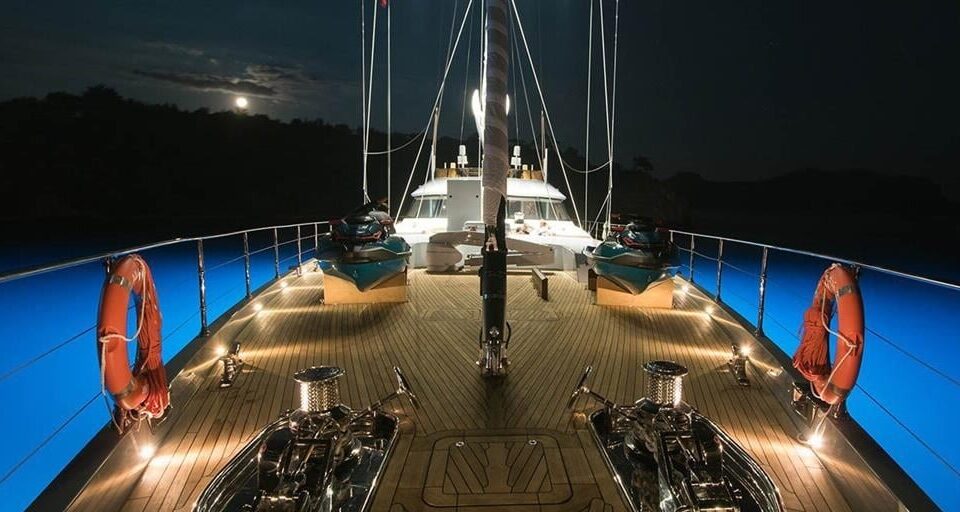
Sailboat Vs Yacht: What is The Difference?
Many boaters use the terms “sailboat” and “yacht” interchangeably when they are actually quite distinct. A yacht is a larger boat or ship that is used for recreational purposes. The term “yacht” is of Dutch origin, and it was initially described as a small, swift sailing vessel used by the Dutch navy to track down and catch pirates. A boat, on the other hand, is a smaller vessel that can range from a fishing boat to a sailboat in size. So, if you’re interested in this topic, this article will compare yachting with sailing in many ways. Like this, you will have a much better understanding of which option is best for you. Keep reading!
Sailboats and Yachts: Meaning
Firstly, it’s important to understand the meaning of each word. Generally, a boat is a form of watercraft that comes in a variety of shapes and sizes. A boat is a watercraft that is small enough to fit on a ship, which is typically less than 1,000 feet long. A ship is a huge vessel with a large carrying capacity that can transport other vessels. The size, shape, and capacity of a boat vary depending on its intended usage. Boats are most commonly employed for navigating places along the water’s edge or inland waterways like lakes and rivers, although they can be utilized on any water source. Boats can be used for a variety of purposes, including providing service to people and vessels on the water, recreational activities, commercial passenger, and cargo transportation across waterways.
So, a sailboat (sailing vessel) is a boat that is propelled primarily by the force of the wind on sails. Keep in mind that the term “boat” can cause some misconceptions about the vessel’s size. People may refer to it as a sailing ship rather than a sailing boat once it reaches a particular size. Also, boats are generally thought to be smaller than ships. A sailboat is a water-borne watercraft whose principal means of propulsion is the wind, which is captured and controlled by triangular-shaped pieces of cloth known as ‘sails.’ On the other hand, a powerboat is a watercraft with an internal combustion engine as its primary source of propulsion.
A yacht is most likely a vessel that is primarily used for personal rather than business purposes. There are yachts that you can hire for a week or more. This might add a little confusion as they are commercially owned but within the hire period, they are used by individuals for leisure purposes. Generally, people usually refer to sailboats as yachts or vice-versa. This is a common phenomenon nowadays, however, there are significantly more sailing yachts than motor yachts at the seaside/marina. If you want to specify a boat that is not largely powered by the wind, use the word motor yacht.
Sailing yachts and motor-powered yachts are the two forms of yachts available today. Yachts range in length from 26 feet to hundreds of feet. A cabin cruiser, or just a cruiser, is a luxury vessel that is less than 39 feet long. A superyacht is typically above 70 feet long. So, what is the definition of a mega yacht? They usually exceed 150 feet in length, but there is no top limit! Note that the world’s largest boat is 728 feet long, or 222 meters.
Let’s now check the main differences between a sailboat and a yacht:
Sails and Motor
The boat may be powered purely by the wind or by one or more inboard or outboard motors, depending on the model. While some larger boats may have very massive engines to provide genuine speed on the water, most yacht engines are far less powerful. Yacht engines are substantially larger, can produce far more power – up to 800hp in some circumstances – and can go many further distances.
If you’re searching for a vessel that’s easier to operate, you could argue that a yacht is a superior option. Sure, the computer components are more complicated, and there is more to manage, but sailing will be simpler. In stormy weather, managing a sail can be tricky. From inside the cabin, you can’t manage your sails. You may, however, operate your yacht from the cabin.
It’s a fact that sailboats will always have sails. After all, it’s their primary source of propulsion. The nail is what propels the boat forward by harnessing the wind. So long as the weather permits, sailing can be done anywhere, at any time. Yachting, on the other hand, has its own set of restrictions. A yacht will usually lack a sail, which can be viewed as a good or negative aspect, depending on your perspective.
The advantage of having a sail over only an engine is that you don’t have to worry about running out of fuel. Fuel is not only costly but also inconvenient and pollutes the environment. When on long voyages, you must always keep an eye on your fuel levels, or you risk breaking down at sea. The great thing with sailboats is that as long as there is wind, a sailboat can sail. If you have an extra sail onboard, you should be alright regardless of what occurs. You have a significantly lower chance of being left stranded at sea.
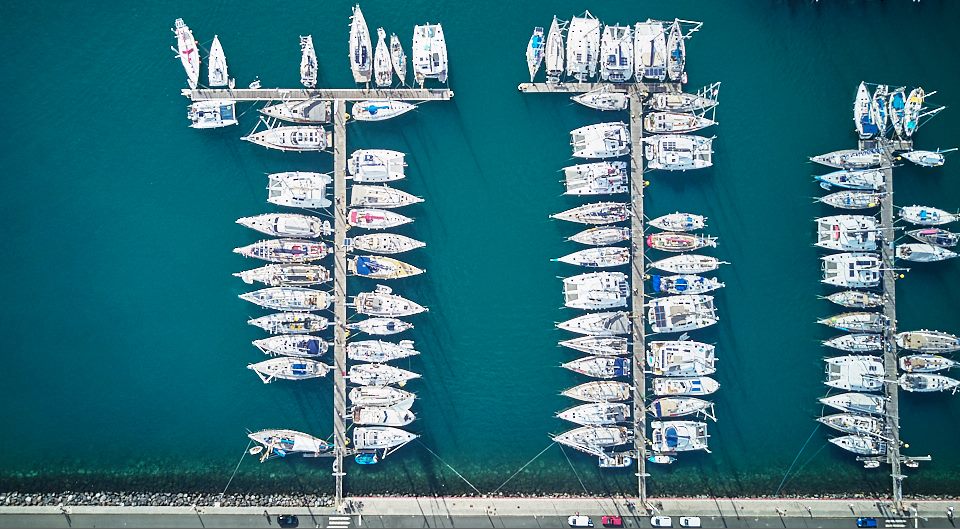
>>Also Read: Sailboats Vs Powerboats: Why Sailboats are Better
Size Matters
The size difference between a yacht and a sailboat is one of the most significant ones. Most of the time, a sailboat will almost certainly be smaller than a yacht. Of course, some sailboats are larger than others, but if we’re talking about average sizes, a yacht will be larger. The reason that size counts so much when deciding which boat to buy is that the available space is limited. So, if you opt for space note that the larger your boat is, the more space you’ll have. This may seem self-evident, but it is one of the most crucial aspects of your boat to which many people forget to give due consideration.
Generally, when it comes to boats, size will always matter. Except in cases where someone prefers overall better performance and speed. But, keep in mind that almost everything you do will be influenced by the size of your boat. The smaller the boat, the less storage space you have, the less space you have for emergency supplies, and even the less space you have for yourself. Regardless of the size of your boat, your sleeping quarters will most certainly be small. Also, depending on your height, every inch of a room may be crucial.
When there are more people on your boat than just you, size matters the most. If you intend to live alone on your yacht, you will have a significant space advantage. If there are three persons on board, you probably going to need more equipment and devices for cooking or for emergencies. All of this suggests that the sleeping space is the most significant distinction between living alone and living with people. If you live alone on a yacht that can sleep four people in theory, you will have a lot more storage and consequently space.
People on Board
The extent to which the crew will influence your decision is mostly determined by your budget and the size of the vessel you are considering buying. Meaning that if you’re intending to buy a sailboat, you won’t need any crew. Except for your family/friends that live on your boat with you, you basically are the entire crew. However, if you own a yacht, it’s an entirely different scenario.
If you intend to live aboard your yacht, you may require the assistance of one or two crew members. There will be plenty to do even if you are the most essential member of the team, i.e. the captain. This is because you might haven’t already mastered things like navigation, maintenance, plumbing, and engineering. So, a yacht often requires a complete crew to assist with navigation, maintenance, electronics and engineering, repairs, and sometimes even stewards to attend to the passengers.
In other words, having a sailboat means that you can take care of everything yourself. There are only a few computer components that will need to be repaired, and you are unlikely to have an engine. Repairing a sailboat isn’t easy in and of itself; it’s just easier for one person to handle. Meaning that it’s far easier to replace a sail than it is to fix an engine. In bad weather, a small sailboat is just easier to monitor than a large yacht. At the absolute least, another set of eyes will be probably required when sailing with a yacht.
Price also Matters
In general, yachts tend to be more expensive than sailboats. Occasionally, a great deal more. For a variety of factors, the most important of which are materials, design, and construction techniques. Note also that a boat’s price is likely to rise as it becomes more modern. Although this isn’t always the case, it is the vast majority of the time. If money is a key factor in deciding which boat to buy, here’s something to think about: just because a yacht is more expensive doesn’t mean you shouldn’t have one. If you have the cash, knowledge, and you know the kind of sailing you will be doing then go for a yacht!
Note also that a sailboat can be outfitted with a variety of amenities and conveniences. But, the sailboat doesn’t always include these features. This will mostly depend on the type of sailboat. As a result, buying a basic sailboat can save you a lot of money. However, most yachts will provide high end amenities. As a result, a motor yacht will cost significantly more than a regular sailboat. Sailboats are also smaller than yachts, which means you have a larger selection of less expensive boats to pick from when making your purchase. But, yachts often start in the six-figure range and can reach millions of dollars depending on the yacht’s size, age, and build quality.
Maintenance and Repairs
Yachts are frequently more expensive to maintain than sailboats. Meaning that boat engines require a great deal of upkeep, and the expense of fuel can be prohibitive for many individuals. For example, did you know that a gallon of diesel fuel in a yacht may only allow you to travel less than 1 nautical mile? If you’re going on a long voyage out to the sea, you can end up spending a lot of money on fuel. A sailboat, on the other hand, can take you wherever you want to go with very little fuel. Bear in mind also that a yacht’s insurance is more expensive than that of a sailboat. One of the main reasons is because it is classified as a yacht.
In addition to the boat’s price there are some other things to consider. The most important one is maintenance and repairs. A boat will always need these and it might need them once per month or once per year. It depends on the kind of repairs and on the way in which you “treat” your boat. Also, if you’re buying a used sailboat, you will need sometimes more research and more money for upgrades. It will be repainted, restored, and upgraded, although it will remain the same size. You should approach buying a boat in the same way that you would with a car. So, according to the size and kind of boat you want to buy, it’s important to keep in mind the price and extra costs as well.
While advanced marine electronics and navigation systems are available on some boats, they are more of a must for yachts. When doing transatlantic voyages, it is critical not only to be able to navigate with precision but also to be able to identify other boats or objects that you may not be able to see, as well as to comprehend your vessel’s performance.
When it comes to technology, it’s not just about whether you’re choosing a sailboat or a yacht. The age of the specific vessel is also something to consider. A sailboat that is more than ten years old may not be as technologically advanced as a brand new sailboat. Better technology can offer a lot of opportunities for you if you decide to buy a yacht. First and foremost, it can make working on your boat much more convenient. There’s no reason you couldn’t work remotely from your boat if you have the ability to set up a functional office with wifi.
Technology also brings up a lot of new possibilities for you when it comes to the act of sailing. A sailboat could traverse the Pacific or Atlantic, but it would be rather difficult. On the other hand, with a yacht, it can be a lot easier. In comparison to a sailboat, your yacht will have advanced navigational systems, warning and guidance systems, and many more safety features.
Sea, Lakes, or Rivers?
Bear in mind that in shallow waters, large yachts are unable to sail. A sailboat is a way to go if you plan on sailing in areas with shallow waters. In the Caribbean, for example, a yacht might be difficult to navigate. At the very least, it’ll be more difficult than sailing. A yacht, on the other hand, may travel to far more places than a sailboat.
A small sailboat might theoretically sail across the Atlantic. However, it can be quite risky, and your boat might not be able to withstand the strong winds and waves. Furthermore, if you’re aboard a sailboat, you can be the only one on board. This means that if the worst happens, far out at sea, there will be no one to aid you. You can do it, of course, but it is risky.
So, smaller boats may normally operate in calmer seas such as lakes, rivers, and shallow harbors. Larger boats, usually between 20 and 30 feet long, can equally navigate rougher ocean seas. A yacht, on the other hand, can sail in deeper ocean waters and handle more choppy seas. Yachts are significantly more ideal for lengthy ocean voyages due to their bigger size, high-tech electronics and guidance equipment, weather protection, and a variety of other characteristics.
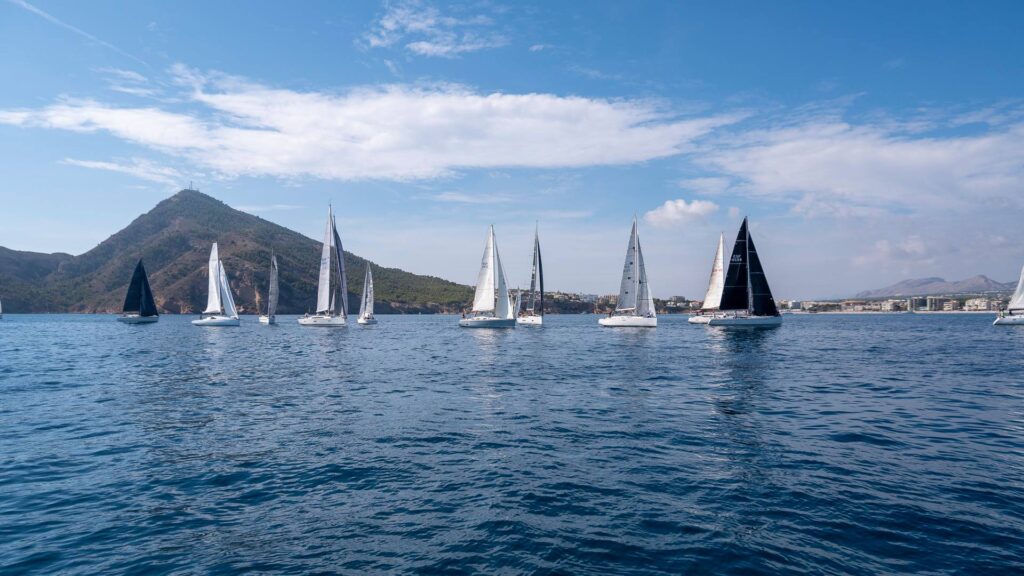
>>Also Read: Sailing Vs Boating: Why Sailing Is Better
Sailboat and Yatch Construction
Depending on the anticipated scale of production, sailboat makers can fabricate their own parts or order them. Masts, sails, engines, and metal fittings are common items provided by specialty vendors. Boatbuilders, on the other hand, create their own fiberglass hulls, using Gel coat polyester resin, a catalyst for the resin, woven fiberglass roving, and fiberglass. Wooden hull manufacturers create and shape their own wood in the same way. Note that the main building materials used in boat construction are aluminum, metal, wood, and fiberglass. The unique structure of each material offers a different design and usage as well as additional features to the way in which the boat is built.
Material considerations are important, whether they affect the cost or the durability of the product. Fiberglass, carbon fiber, and metals such as titanium will also be used to construct a boat. On the contrary, a sailboat will most likely be composed of wood or fiberglass. So, in case you value safety and sturdiness above all else, and money isn’t a big issue, a yacht will be significantly safer for you.
The material can also influence the way in which you make repairs. For instance, a wooden boat is much easier to repair than a metal boat. You can make some simple and quick repairs using wood, and they’ll probably last till you get to a marina. To do major repairs on a yacht, you’ll need a lot of specialized equipment and knowledge. Moreover, you may need to ask for a crew member to help you with this.
Sailboat Vs Yacht – Summary
As you can see there are many differences between a sailboat and a yacht. Nowadays many people tend to confuse or don’t be aware of the exact meaning and differences of these vessels, and it’s normal. But, we, as sailors, have to know the differences in order to understand which kind of boat is right for us. For example, if you want big spaces, luxury, or intend to liveaboard then you should opt for a yacht. But, if you want to experience the true joy of sailing, sail anywhere without worrying about polluting the environment or spending too much on fuel, then go for a sailboat! It will entirely depend on your needs and preferences so weigh the pros and cons of each one before making the decision.
In any case, I hope that you have now clarified the differences between these two and that you will make the right choice. I wish you all safe & enjoyable voyages!
Peter is the editor of Better Sailing. He has sailed for countless hours and has maintained his own boats and sailboats for years. After years of trial and error, he decided to start this website to share the knowledge.
Related Posts

Atlantic vs Pacific: Which is More Dangerous for Sailing?
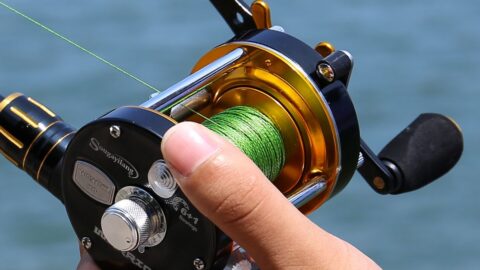
The Ultimate Guide to Choosing the Best Fishing Line for Trolling
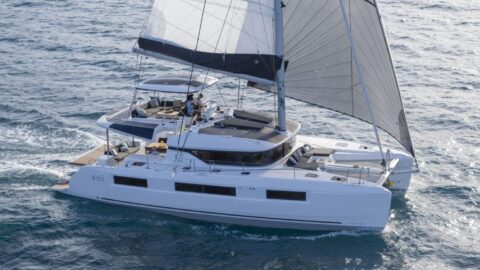
Lagoon Catamaran Review: Are Lagoon Catamarans Good?
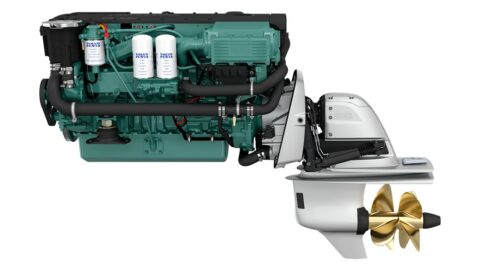
Best Inboard Boat Engine Brands
- Buyer's Guide
- Destinations
- Maintenance
- Sailing Info
Hit enter to search or ESC to close.
Breaking rules, setting trends
- Open search box

Should I buy a yacht? The pros and cons of owning a powerboat
Discover the intricate world of motor yacht ownership. Understand costs, benefits, potential income opportunities, and lifestyle impact of buying a boat.
If you've landed on this page, it's likely that the idea of owning a powerboat has been playing on your mind. Perhaps the allure of sunsets at sea, thrilling rides on blue waters, or the promise of freedom and adventure have stirred up the question: Is buying a boat a good idea? We recognize that this is a significant decision, and it's crucial to thoroughly consider all aspects before plunging into such a commitment.
In this guide, we aim to navigate you through the intricacies of motor yacht ownership. We'll delve into the pros and cons of buying a boat, aiming to illuminate the grey areas and hopefully answer the myriad of questions that are likely swimming in your head. Things like, "Can I afford it?" "Is buying a boat a good investment?" "How will it change my lifestyle?" and ultimately, "Is buying a boat worth it?"
But first, let's start off with the very basics.

The pros and cons of buying a boat
Similar to any significant investment, there are numerous pros and cons of buying a boat that deserve careful consideration. These must be judiciously balanced against your individual needs, lifestyle, and financial capacity.
Why buying a motor yacht can be a good idea?
Here are eight compelling reasons that illuminate the benefits of owning a motor yacht:
The upgrade: How yacht ownership enhances lifestyle
Owning a yacht can significantly upgrade your lifestyle. Imagine leisurely cruising the open waters, throwing lavish parties, or taking spontaneous weekend trips to secluded islands. This can provide an unprecedented level of luxury, freedom, and flexibility that few other possessions can match.
Embracing speed and power with motor yachts
Motor yachts are renowned for their speed and power, enabling quick voyages and swift exploration. If your idea of boating includes covering vast distances in less time, a motorboat might be your ideal marine partner.
The simplicity in navigating motorboats
Motor yachts offe r more straightforward operations than their sailing counterparts. Thanks to their mechanical propulsion systems, you can skip the learning curve associated with understanding wind patterns and mastering sailing techniques.
Experiencing luxury comfort aboard motor yachts
Motor yachts are synonymous with comfort and luxury. With spacious interiors, modern amenities, and elegant living quarters, they deliver a top-tier experience that could make the sea feel like your second home.
Social and family connections aboard yachts
A yacht can be a perfect platform for creating unforgettable memories with family and friends. The shared experiences of sailing, exploring new locations, or simply enjoying each other's company in a unique setting can foster deeper connections.
Turning yachting luxury into profit
Buying a boat can be a good investment. When you're not using your motor yacht, it doesn't have to sit idle. Many owners charter their boats, transforming their luxury assets into income-generating ones.
Powerboat cruise itinerary flexibility
Motor yachts offer the freedom and flexibility to chart your course, regardless of the wind. This means you have greater control over your itinerary and can easily adjust your plans based on changing desires or weather conditions.
The freedom of adventure and exploration with motor yachts
Owning a motor yacht means having a gateway to unlimited adventure. You have the liberty to explore secluded coves, visit remote islands, or embark on extended cruising expeditions whenever the sea calls.
Motor yachts: Your personal retreat for privacy and exclusivity
If your preference leans towards private, exclusive vacations away from crowded tourist spots, then a motor yacht can serve as your personal oasis. Enjoy peace and tranquility on the open sea, with horizons all to yourself.
When buying a boat might be a bad idea
While owning a motor yacht can bring numerous benefits, there are also potential downsides to be aware of. Here are a few reasons why buying a motor yacht might not be the best choice for everyone:
If you’re not ready to make a significant initial investment
If you're not quite prepared for a considerable financial outlay, the initial cost of yacht ownership could be a deterrent. Luxury motorboats can be expensive; the bigger and more sophisticated the boat, the higher the price tag. On the bright side, several options exist to finance a motorboat !
If you're not willing to maintain a sufficient expense level
Owning a yacht involves more than just the initial purchase price. Maintenance, motorboat insurance , docking fees , fuel, and potential crew salaries can add up, leading to substantial annual expenses that must be factored into your budget. However, it's worth noting that with thoughtful planning and management, there are several strategies to help keep these costs more manageable.

Quicksilver vs Merry Fisher
When you think about your first cabin boat it is worth to consider great brands: Jeanneau with Merry Fisher lines and Brunswick with Quicksilver Weekend boats.
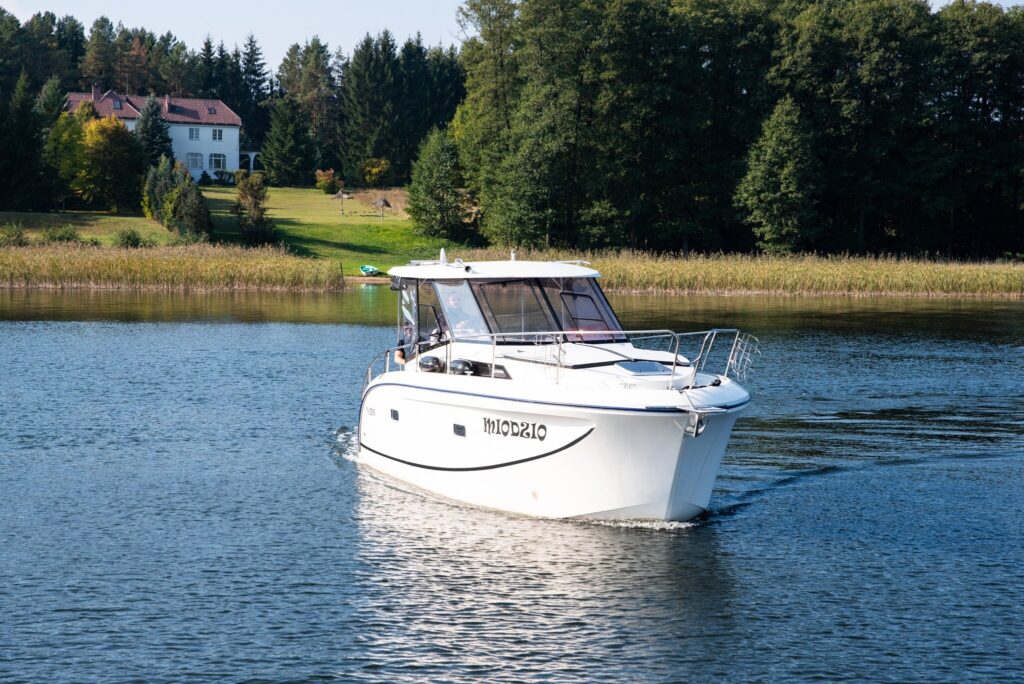
Hausboot Masuren
Der beste Urlaub in Polen? Hausboot Masuren mieten ohne Führerschein. Schauen Sie sich das Angebot an!

Boat license
Which boating licence is respected in Europe? Do I need a license to drive a boat?
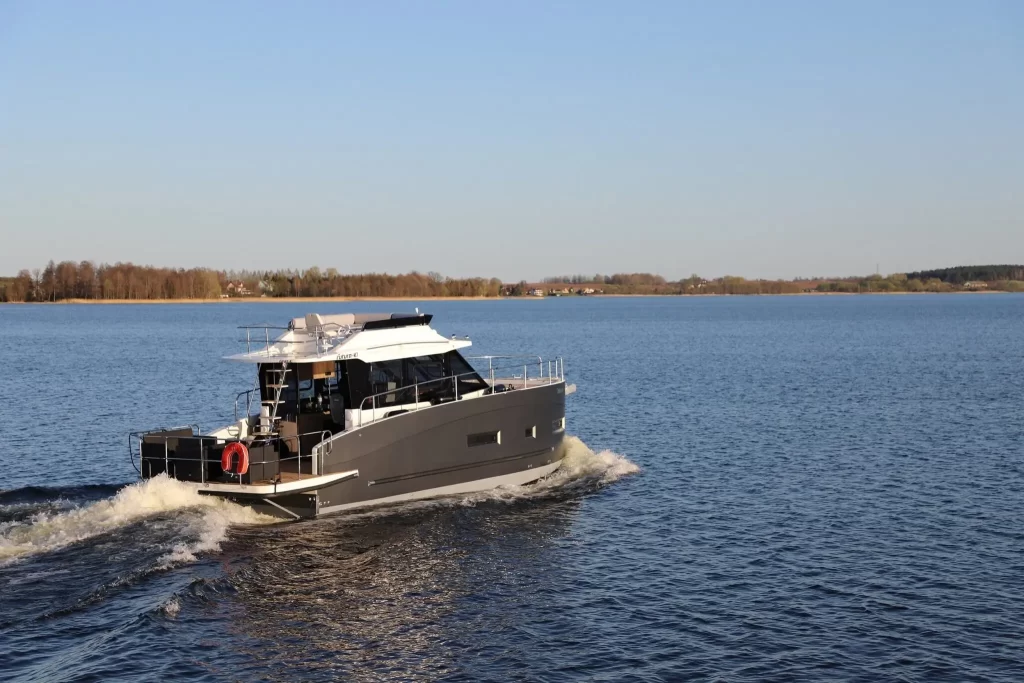
Magic place to control your perfect cruiser

Planing hull
Unlimited speed, great nautical performance.
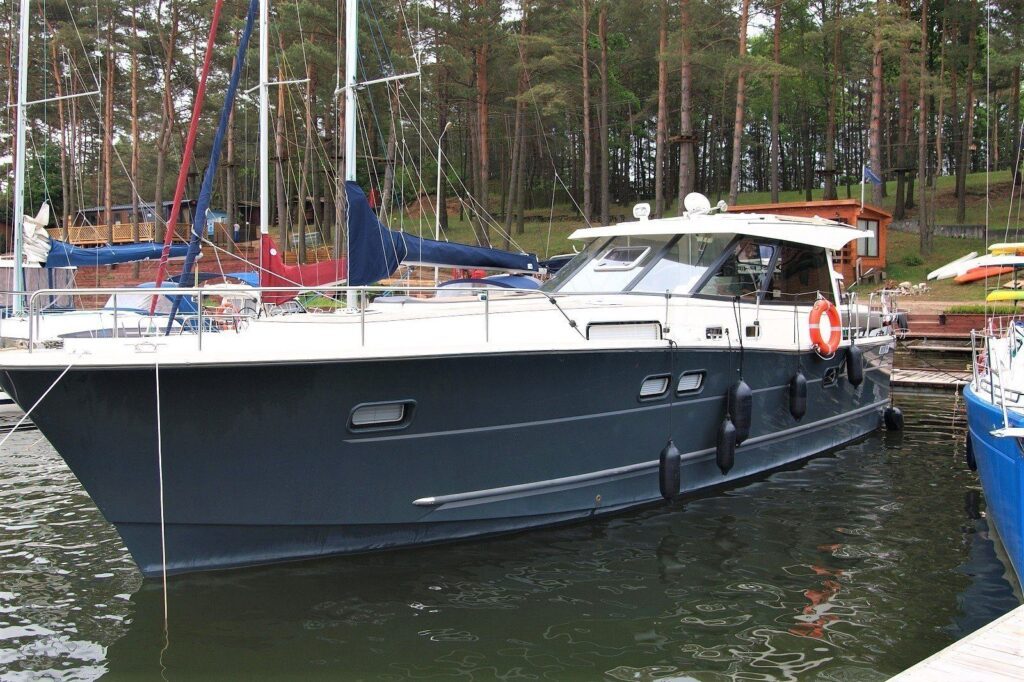
Displacement hull
Floating luxury hotel with max speed 15 km/h

A great sunny bow place.
What is the main difference between a Motor Yacht and a Boat? The owners club answer
A yacht is a larger boat that is mainly used as a status symbol. The word was originally defined as a light and fast vessel. It can be expensive to purchase and maintain a yacht, but it is the fastest boat on the water. Motor yachts can be luxurious or contain all of the newest technology, but they are not as common as boats. A big difference between these boats is their size.
Check the best motor yachts for sale in Europe
Boats are usually cheaper than yachts, and many people use them for their job such as fishermen or Navy officers. They are often used for fishing and hunting trips too because they have smaller engines and more storage space than yachts do. There is no universal definition of what qualifies as a boat, but many owners from exclusive boat yacht clubs classify them by weight instead of size for more accuracy.
Yacht vs boat, the magazine definition: weight, registration, license, insurance
Boats are vessels that operate in the water. They have a motor and a single mast. The type of boat is determined by its size and weight. Size is measured by length while weight is measured by displacement tonnage. A boat needs a registration number to be legal for use on the water. If you want your boat to be legal it needs a license, which will also include an insurance policy against any damage or injury it might cause other boats or people while on the water.
Boats have the option to use either an outboard or an inboard engine for propulsion purposes. While this decision largely depends on the preference of the boat's owner, their speed is determined by how powerful the motor is and how much fuel it has stored.
Boats are, by nature, vessels that can be enjoyed on the water or on land. They are most commonly powered by outboard engines.
A yacht is a financial instrument that is used for recreational purposes and can be worth hundreds of thousands of dollars. Yacht engines are typically more expensive than outboard boat engines because they are optimized for luxury boats. There are many benefits that come with owning a boat with an engine such as the fact that it needs no fuel and can be started on one's own; however this comes at a cost of high maintenance and expensive costs.
While they offer a more powerful and fuel-efficient option than their inboard counterparts, they also come with a higher price tag. To run a boat with an outboard engine safely (according to many professional boat and yacht magazines), it is important that you get the right type of certification and licensing.
What makes a boat a yacht? The meaning of a navigation
The yacht needs a crew of people who will ensure the boat is always in good condition and that it does not run into any problems while sailing. The captain and the crew must know how to operate the yacht and work together.
This is what you get with a boat - one captain and engine operator, plus a deckhand for maintenance. Yachts, however, need at least two captains, an engineer, a chef to prepare food for the crew, a navigator to chart courses, plus more deckhands to do maintenance on board.
Mentioned prices are EXW net EUR – do not include VAT, transport costs to the customer and other costs that may occur. All data and information provided on this website is for informational purposes only and does not constitute a binding offer.
We are a member of:

mBoat Spacerowa 27 11-600 Kolonia Rybacka POLAND
Contact page
+48 737 416 183
- Bottom Painting & Prop Speed
- Fiberglass & Paint Work
- Running Gear & Valves
- Full-Service Team
- Monthly Maintenance Programs
- Dockside Service Team
- Full-Service Boatyard
- Management Services
- Accounting & Reporting
- Relevant Management Experience
- News and Media
Aluminum vs. Fiberglass Boats

Knowledge of these disparities empowers yacht enthusiasts to align their preferences, intended usage, and long-term maintenance considerations with the most suitable material. Informed decision-making ensures a vessel that not only meets immediate needs but also stands resilient against the diverse challenges of marine environments, optimizing the overall yachting experience. If you want to learn more about this subject from the experts at Yacht Management , the leader among South Florida yacht maintenance companies, all you'll need to know is explained here.
The Basics of Fiberglass vs. Aluminum Boats When considering yacht construction materials, it's essential to comprehend the distinctive properties, characteristics, and associated pros and cons of aluminum boats as well as marine fiberglass vessels. Aluminum boats are renowned for their lightweight yet robust nature, boasting a high strength-to-weight ratio. Additionally, a boat made of aluminum exhibits corrosion resistance due to the formation of a protective oxide layer. Its conductivity is noteworthy, contributing to temperature control within the yacht. Advantages of aluminum include excellent strength, a prolonged lifespan, and efficient repairability through welding. However, the initial cost can be higher, and achieving complex designs may pose challenges.
On the other hand, fiberglass boats offer a different set of features. Fiberglass, recognized for being lightweight and durable, provides a favorable strength-to-weight ratio. Unlike metals, fiberglass doesn't corrode, and its insulation properties reduce condensation inside the yacht. Fiberglass boats generally come with a lower initial cost and greater design flexibility, allowing for intricate shapes and patterns. The smooth finish of fiberglass contributes to a sleek appearance. However, challenges such as potential delamination and limited repair options for certain damages should be considered when weighing aluminum vs. fiberglass boats.
In practical terms, aluminum finds its place in sailboat hulls and decks, commercial vessels like fishing boats, and expedition yachts that need to withstand harsh conditions. Fiberglass, with its balance of cost and performance, is widely used in recreational yachts, luxury cruisers, and high-performance boats that prioritize speed and agility in specific designs. Understanding these fundamental characteristics lays the groundwork for yacht owners to make informed decisions based on their specific needs and preferences.
Structural Considerations of Marine Aluminum and Fiberglass When delving into the structural considerations, it becomes evident that the choice between aluminum and fiberglass significantly impacts a yacht's overall performance and durability. The strength and durability of aluminum are particularly noteworthy, making it an ideal material for yachts navigating demanding marine environments. Its resilience against rust and deterioration ensures a prolonged lifespan, which is crucial for yacht owners looking for a vessel that can withstand the test of time. Fiberglass, which over time can deteriorate, offers a balance of affordability and performance, which makes it excel in its own right.
Understanding the structural integrity of each material in different weather conditions and sea states is vital. Aluminum's robustness is well-suited for adverse conditions, while fiberglass provides a lighter alternative that can enhance fuel efficiency and handling in certain situations. Yacht owners must carefully evaluate these factors to ensure their chosen material aligns with their specific usage requirements when weighing their options for aluminum vs. fiberglass boats.
Construction and Design Insights from Our Yacht Care Team When discussing differences in construction and design, aluminum vessels and boats made of all fiberglass offer unique advantages that cater to distinct preferences within the yachting community. Aluminum's sturdy structural elements and weldability make it a popular choice for sailboat hulls, decks, and commercial vessels like fishing boats. The ability to efficiently customize and incorporate specific features enhances its appeal for yacht owners seeking a tailored experience.
Fiberglass, on the other hand, with its smooth finish and greater design flexibility, opens up a realm of possibilities in the recreational yachting sector. Luxury cruisers and high-performance boats benefit from the aesthetic appeal and agility that fiberglass affords. Understanding the nuances of customization options and the build complexity of aluminum vs. fiberglass boats allows yacht owners to envision and create a vessel that seamlessly aligns with their aesthetic and functional preferences.

Maintenance and Repair Differences Maintenance and repair considerations are pivotal aspects of yacht ownership. The divergent characteristics of aluminum vs. fiberglass boats play a crucial role in these areas. Aluminum can be susceptible to corrosion if diligent preventive measures aren’t taken. However, its repairability through welding can be a cost-effective solution. On the flip side, fiberglass owners must contend with potential issues such as gelcoat damage and delamination, requiring specialized attention. While fiberglass offers a generally more affordable initial cost, certain repairs may necessitate professional assistance.
Comparing the costs and ease of maintenance and repairs for both materials is paramount. Yacht owners should consider not only the immediate financial implications but also the long-term sustainability of their chosen material in the face of routine maintenance and unforeseen repairs. This comprehensive approach ensures a thorough understanding of the practical aspects of yacht ownership, allowing owners to navigate the waters of maintenance with confidence.
Contact Our Yacht Maintenance Company Are you in search of an exceptional leader in yacht care services to oversee the well-being of your aluminum vs. fiberglass yachts or another vessel you may own? Look no further than Yacht Management. Our dedicated Fort Lauderdale yacht service team is prepared for seamless collaboration, providing unparalleled expertise in the industry.
Delve into our insightful yachting blog articles on effective yacht management, tailored for both novice and seasoned enthusiasts. Reach out to us effortlessly through our user-friendly online form or a direct phone call to experience the utmost care for your aluminum vs. fiberglass yachts.
We eagerly anticipate becoming a valuable addition to your maritime team, ensuring your yachts are primed for their next remarkable journey.
FAQs of Aluminum vs. Fiberglass Boats
What is the downside of aluminum boats?
Aluminum boats, while durable and resistant to corrosion, can be initially more expensive compared to other materials like fiberglass. Some may find that achieving intricate designs with aluminum can be challenging. However, the advantages often outweigh these considerations, particularly in terms of strength and longevity.
What lasts longer: fiberglass or aluminum?
Both fiberglass and aluminum boats can have impressive lifespans when well-maintained. However, aluminum's natural resistance to corrosion may contribute to a longer overall lifespan, especially in harsh marine environments. Proper care and maintenance are key factors in ensuring the longevity of any boat, regardless of the material.
Do aluminum boats ride rough?
Aluminum boats are often associated with a robust and sturdy build, which can contribute to a stable and comfortable ride. Advances in design and technology have minimized any historical concerns about a rough ride. In fact, many aluminum boats today offer smooth and enjoyable experiences on the water.
Why are aluminum boats so popular?
Aluminum boats have gained popularity for several reasons. Their high strength-to-weight ratio makes them suitable for various marine applications, from commercial vessels to recreational boats. Additionally, their durability and resistance to corrosion make them ideal for use in challenging saltwater environments. The versatility of aluminum contributes to its widespread popularity among boat owners.
Are fiberglass boats worth it?
Fiberglass boats are highly valued for their design flexibility, which allows for intricate shapes and styles. They are generally more affordable upfront compared to aluminum, making them an attractive option for budget-conscious boat owners. The smooth finish of fiberglass contributes to an aesthetically pleasing appearance. When considering the long-term value, the choice between fiberglass and aluminum depends on individual preferences and specific usage requirements. Both materials offer unique benefits, and fiberglass boats are undoubtedly worth considering for their balance of cost and performance.
Related Readings Maintaining a Clear Coat on Fiberglass Boats
When to Have Boat Fiberglass Repairs Done

For all inquiries, fill out the form below and a member of our team will respond as soon as possible

Killer whale vs shark: solo orca eats great white
A solitary killer whale, or orca, has been filmed hunting and killing a great white shark in an "astonishing" attack.
Scientists said it was "unprecedented" and showed the exceptional predatory skills of killer whales.
Two orcas in particular off South Africa's coast have been observed before working together to hunt and kill sharks, including great whites.
"But this caught us off guard," said shark biologist Dr Alison Towner.
- Orcas 'learning from adults' to target boats
- Whale song mystery solved by scientists
Dr Towner, who is from Rhodes University in Grahamstown, South Africa, has studied the animals for several years. She and her colleagues published a detailed and grisly account of their new observations.
The attack - filmed in 2023, which you can watch here - was, scientists, said "solo and swift". The male killer whale killed the shark and consumed its liver - all in under two minutes.
Scientists first captured drone footage of two male orcas working together to hunt great white sharks in 2022 .
The scientists then reported that the animals, nicknamed Port and Starboard because their dorsal fins are bent in opposite directions, "exhibited a predilection for extracting and consuming the sharks' livers".
During the attacks, the sharks would tightly circle the killer whales, in a desperate attempt to avoid predation," recalled Dr Towner.
In this newly reported attack, Starboard hunted on his own. Scientists described how the orca gripped the left pectoral fin of a 2.5m long juvenile shark and "thrust forward several times before eventually eviscerating it".
Marine mammal scientist Dr Luke Rendell from the University of St Andrews said it "a really beautiful observation" of the behaviour.
"It's interesting that it's just one animal," he told BBC News, and how much skill it demonstrates in tackling the shark - ramming it in the side and grabbing the pectoral fin to keep away from those big, nasty jaws.
"A great white shark is a nice, big concentration of food, so it's perhaps unsurprising that some populations [of orcas], where these sharks occur in sufficient numbers, have learned to exploit that."
It raises questions about how killer whale behaviour might be affecting the shark populations in the areas.
The scientists do not know what is driving the behaviour, but Dr Towner told BBC News that it was becoming evident that "human activities, like climate change and industrial fishing, are exerting significant pressures on our oceans".
And there could be health repercussions for killer whales hunting sharks, including ingesting toxins and metals from shark flesh.
"Disruptions in the balance of apex predators can affect other species too," explained Dr Towner. "Endangered African penguins could face increased predation by cape fur seals [if the fur seals are not being eaten by] white sharks."
Dr Rendell pointed out that there was no way of knowing if the behaviour was new or simply observed for the first time. "But what really stands out is is how skilful these animals are as hunters."
Dr Towner added that every discovery in these interactions [between orcas and sharks] was "fascinating".


Sinbad Gives Health Update, Teases Return to the Spotlight After Stroke

Celebrate Eva Mendes' Big 5-0 With Her Most Stunning Snaps ... 50 And Fabulous!

Kate Middleton Seen in Public for First Time Since Mystery Hospitalization

Stars Rockin' The Vote ... See Which Famous People Hit The Polls!

'16 and Pregnant' Star Sean Garinger Dead at 20 After ATV Accident
Sophie turner & boyfriend flaunt pda in paris while joe jonas is down under, sophie turner not sweatin' joe's love down under flaunts pda in paris w/ bf, 109 3/4/2024 4:25 pm pt.
Joe Jonas isn't the only one heating things up abroad -- his ex, Sophie Turner , once again flaunted some PDA with her new boyfriend ... as seen in some steamy new pics.
The "Game of Thrones" alum cuddled up to her British aristocrat boo, Peregrine Pearson , while wandering the streets of Paris amid Fashion Week. It's clear that Sophie and Peregrine are still going very strong ... since they couldn't stop smiling during their romantic outing.
The couple wasn't shy about putting their love on display either -- as they were photographed walking arm-in-arm ... and even shared a smooch or two on the street, something they've made a habit of since going public in October.
This latest display of affection notably comes amid Joe's blossoming relationship of his own, which is also full-steam ahead. ICYMI ... the JoBro singer proved he, too, has 100% moved on from Sophie by rebounding with beauty queen-turned-actress Stormi Bree .
SB even joined JJ down in Australia amid the JoBros' international tour. Stormi was recently with Joe for a yacht outing at the Sydney Harbor -- and participated in some swimming, paddleboarding and day drinking with her boyfriend.
It's clear they're official, just like ST and PP are -- and they're obviously enjoying spending time together ... having previously linked in Los Cabos and Aspen the last several weeks.
Remember -- Joe and Sophie currently have a custody agreement in place for their kids, Willa and Delphine , amid their pending divorce ... so it's unclear if they're in Paris with mom or down under with dad.
In any case, it appears that everyone involved is having a nice March.
C'est la vie, right?
- Share on Facebook
related articles

Sophie Turner's Fans Rally To Her Defense After Mom-Shaming Comments

Sophie Turner Ready to Drop 'Child Abduction' Claim Against Joe Jonas
Old news is old news be first.

COMMENTS
The maritime definition of a yacht is a private pleasure ship of at least 33 feet. At YachtWorld, we tend to consider anything in the 35-40-foot range (or larger) a yacht. Then again, different kinds of boats approach being that long, even some pontoon boats and walkarounds. However, an engine-powered watercraft under 30 feet is not usually ...
It also refers to a tender to a bigger boat or yacht. "Ship" is a large commercial boat, often used for distance travel and transport of goods or passengers - cruise ship, container ship, etc. "Yacht" is typically a larger boat with luxury amenities used as a recreational vessel— motor yacht, sailing yacht. "Superyacht" is a ...
A boat becomes a "ship" often once it's reached a specific size, which tends to be on the bigger side and suitable for sea travel. In most cases, ships serve as working vessels, such as transport or cruise liners. "Yachts" are also more substantial, but they're solely recreational vessels and often used for luxury purposes.
Yacht Size vs Boat Size. As we mentioned above, people have different opinions about how big a yacht has to be. The bare minimum seems to be at least 33 feet. That said,I have even seen smaller boats called yachts but let's say, at a minimum, any vessel under 30 feet will always be a boat of some kind and would rarely if ever be properly ...
Ultimately it comes down to this: all three of them are boats, but yachts are fancier, larger, and used for recreation, and ships are even larger, used commercially or by the navy, and are meant to cross oceans. The dividing line is sometimes thin, but generally speaking, when it comes to boats vs. ships.vs. yachts you can go by the adage " I ...
Speed Boat vs Yacht. When comparing a speed boat and a yacht regarding performance, the speeds you can reach with a yacht over 79ft are normally immensely higher than with a smaller boat. Speed boats, also known as performance boats or sport boats, differ from yachts in terms of size and purpose. Larger speed boats can be categorized as ...
A boat is often expected to be smaller than a ship or a yacht. Generally, a vessel anywhere from 15-30 feet in length will be called a boat. Starting from 15 meters (50 feet), private luxury recreational crafts can be considered yachts. Starting from 24 meters (79 feet), you are entering the superyachts area. Azzam Yacht, 590 ft.
Yachts vs. Boats: A Nautical Choice Deciding between a yacht and a boat isn't just picking a watercraft; it's about embracing distinct water-bound lifestyles. This choice goes beyond mere selection—it dives deep into the unique vibes, moods, and values that each vessel radiates—both present enchanting seafaring experiences tailored to ...
It is said that the best way to differentiate between a ship and a boat is to remember that "A boat can travel with a ship, but the reverse is also true.". Technically, a yacht is defined as a mode of water transportation that weighs at least 500 tonnes. In contrast, boats are required to have relatively small structural sizes and ...
There are many nuances and subtle differences between water vessel types, but below are some of the main differences. In general, yachts are either sailing or motor vessels used for pleasure. Yachts are often luxurious and equipped with an overnight cabin. Boats can be either propelled sail or a motor and come in varying sizes.
Typically, boats are smaller vessels that can be operated by just one or two people, while larger yachts require a full crew to operate safely. Depending on the size of the yacht, the crew may include a captain, officer (s), engineer (s), chef (s), steward (s), deck crew, and other specialized personnel.
As previously mentioned, size matters when it comes to differentiating between a boat and a yacht. Yachts can range from about 35 feet in length all the way up to 160+ feet in length, however, most will be somewhere in the middle. Anything over 160 feet would be considered a "Superyacht". Boats are generally anywhere from 15-30 feet in length.
Yacht vs. boat The word yacht typically refers to a vessel used for private, noncommercial reasons (those other than business), such as sailing or racing. As a general term, the word yacht can refer to any watercraft that isn't intended to be used to make money, which includes anything from racing sailboats to billionaires' floating ultra ...
Boat vs Ship vs Yacht. When it comes to watercraft, there are three main types: boats, ships, and yachts. Each type has its own distinct features and purpose. Boats are the smallest of the three types of watercraft. They are designed to float or plane on the water and are propelled by oars, sails, or a motor.
Difference in Size. Yachts are typically larger than boats, often measuring over 40 feet long. While boats come in various sizes, they often range from around 20-30 feet in length. Boats are usually smaller and built for leisurely activities like fishing or cruising on lakes and rivers.
A boat, on the other hand, is a more general term that can refer to any type of vessel. It may be smaller and less expensive than a yacht, and can be used for a variety of purposes, such as fishing, sailing, or simply transporting people or cargo. In general, 'boat' is a more generic term than 'yacht'.
Sailing Yacht vs Sailboat. The terms "sailing yacht" and "sailboat" are often used interchangeably, but there are some nuanced differences. While all sailing yachts are sailboats, not all sailboats are considered yachts as a yacht is classified as a vessel over 79ft. Sailing yachts are typically larger, more luxurious vessels, equipped ...
1. Size. A yacht is almost always bigger than a regular boat. This is because a boat by definition is any water vessel or floating transport that can be stowed aboard a ship. A boat can be of any size. In fact, more technical guides provide that a boat is any floating transportation that does not go over 196 feet LOA.
One of the main differences between a houseboat and a yacht is their design or appearance. If you take a closer look at a houseboat, you will notice it resembles something that looks like a floating home. And this explains why it's called a houseboat. It's a combination of a small house and a boat, thus the name.
Motor Yacht vs House Boat . Motor yachts are sleek, motor-powered vessels built for cruising at higher speeds. They offer the best of both worlds, combining the comfort of a house boat with the agility and performance of a yacht. House boats, on the other hand, are more stationary and ideal for leisurely living or exploring calm waterways.
Many boaters use the terms "sailboat" and "yacht" interchangeably when they are actually quite distinct. A yacht is a larger boat or ship that is used for recreational purposes. The term "yacht" is of Dutch origin, and it was initially described as a small, swift sailing vessel used by the Dutch navy to track down and catch pirates. A boat, on the other hand, is a smaller vessel ...
The pros and cons of buying a new boat vs a used one . Opting for a used boat is an alternative that can notably reduce your initial investment and alleviate the impact of depreciation. A well-maintained pre-owned vessel can offer the same benefits and luxuries as a brand-new one but at a markedly reduced price.
Yacht vs boat, the magazine definition: weight, registration, license, insurance. Boats are vessels that operate in the water. They have a motor and a single mast. The type of boat is determined by its size and weight. Size is measured by length while weight is measured by displacement tonnage. A boat needs a registration number to be legal for ...
The Basics of Fiberglass vs. Aluminum Boats When considering yacht construction materials, it's essential to comprehend the distinctive properties, characteristics, and associated pros and cons of aluminum boats as well as marine fiberglass vessels. Aluminum boats are renowned for their lightweight yet robust nature, boasting a high strength-to ...
A solitary killer whale, or orca, has been filmed hunting and killing a great white shark in an "astonishing" attack. Scientists said it was "unprecedented" and showed the exceptional predatory ...
The cost of a speed boat can vary significantly based on several factors, including size, brand, features, and overall quality. Entry-level small speed boats can range from $10,000 to $30,000, while luxury speed boats equipped with high-end amenities can exceed several million dollars. Speed boats and yachts offer distinct experiences on the water.
Joe Jonas isn't the only one heating things up abroad -- his ex, Sophie Turner, once again flaunted some PDA with her new boyfriend ...as seen in some steamy new pics. The "Game of Thrones" alum ...